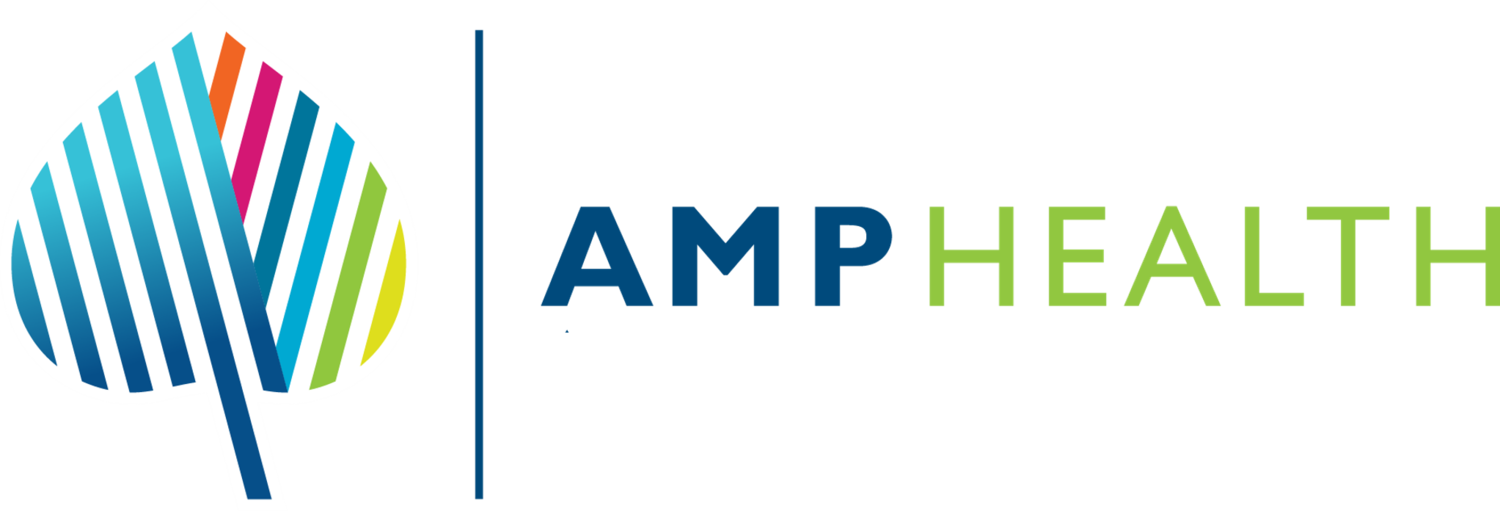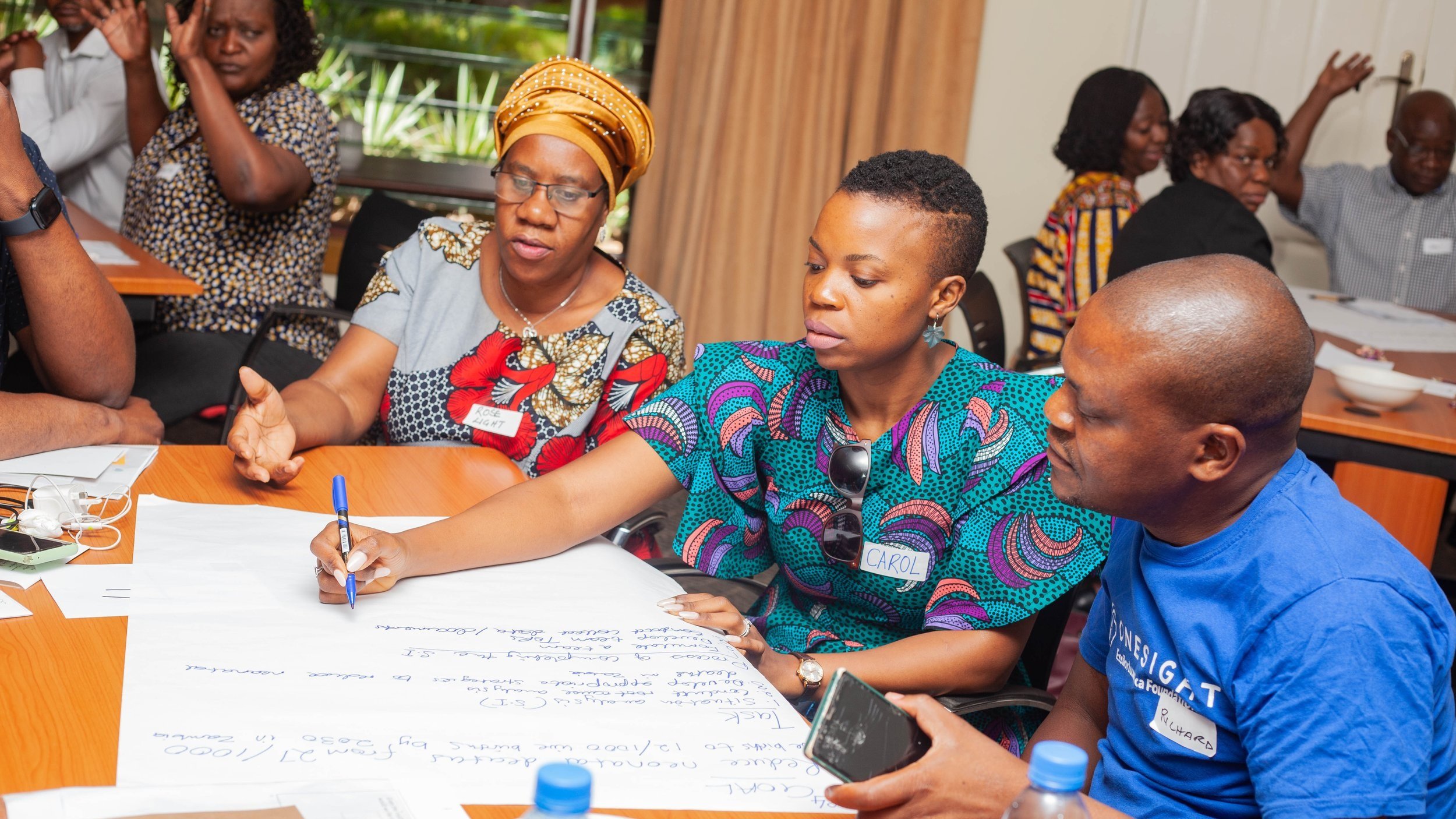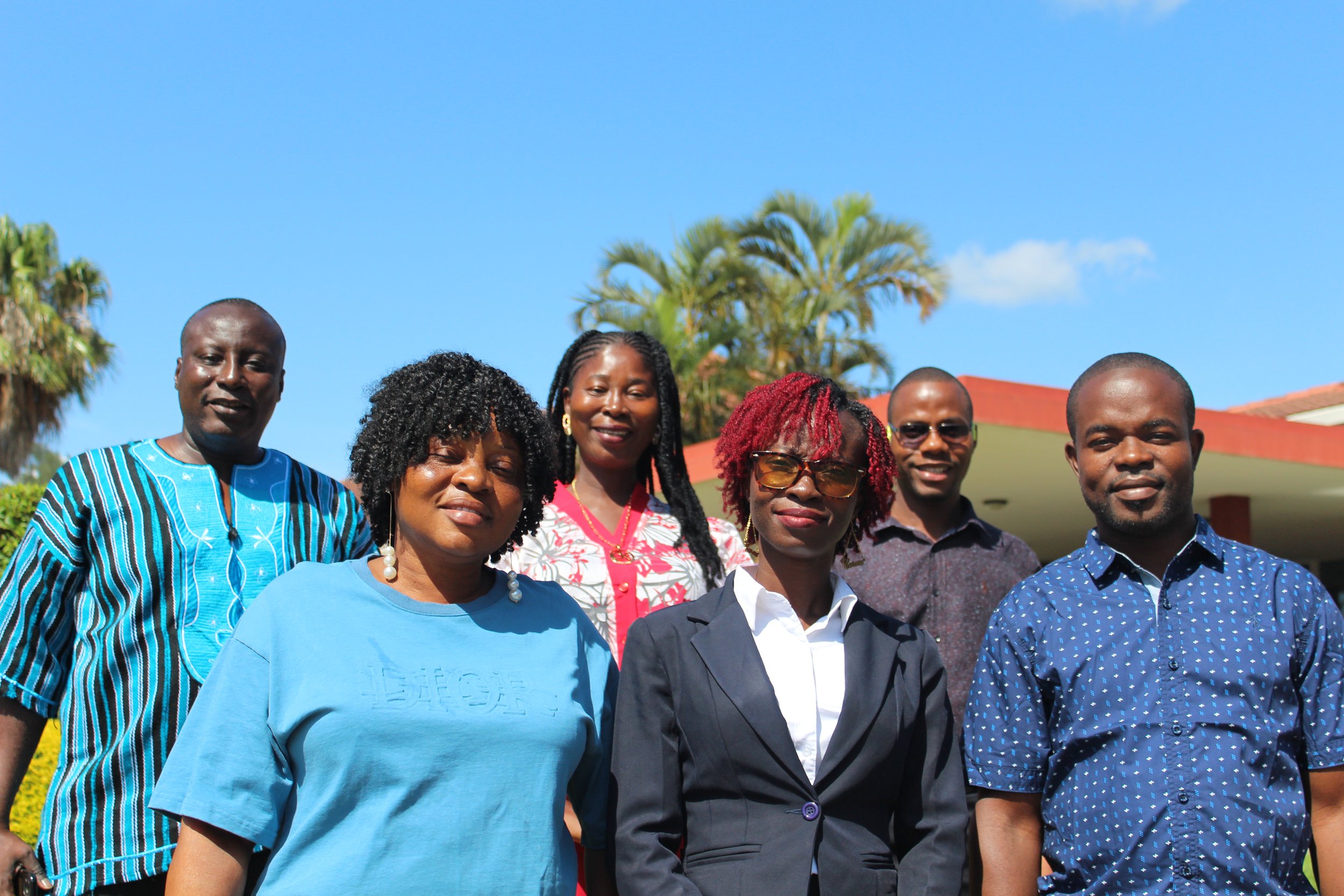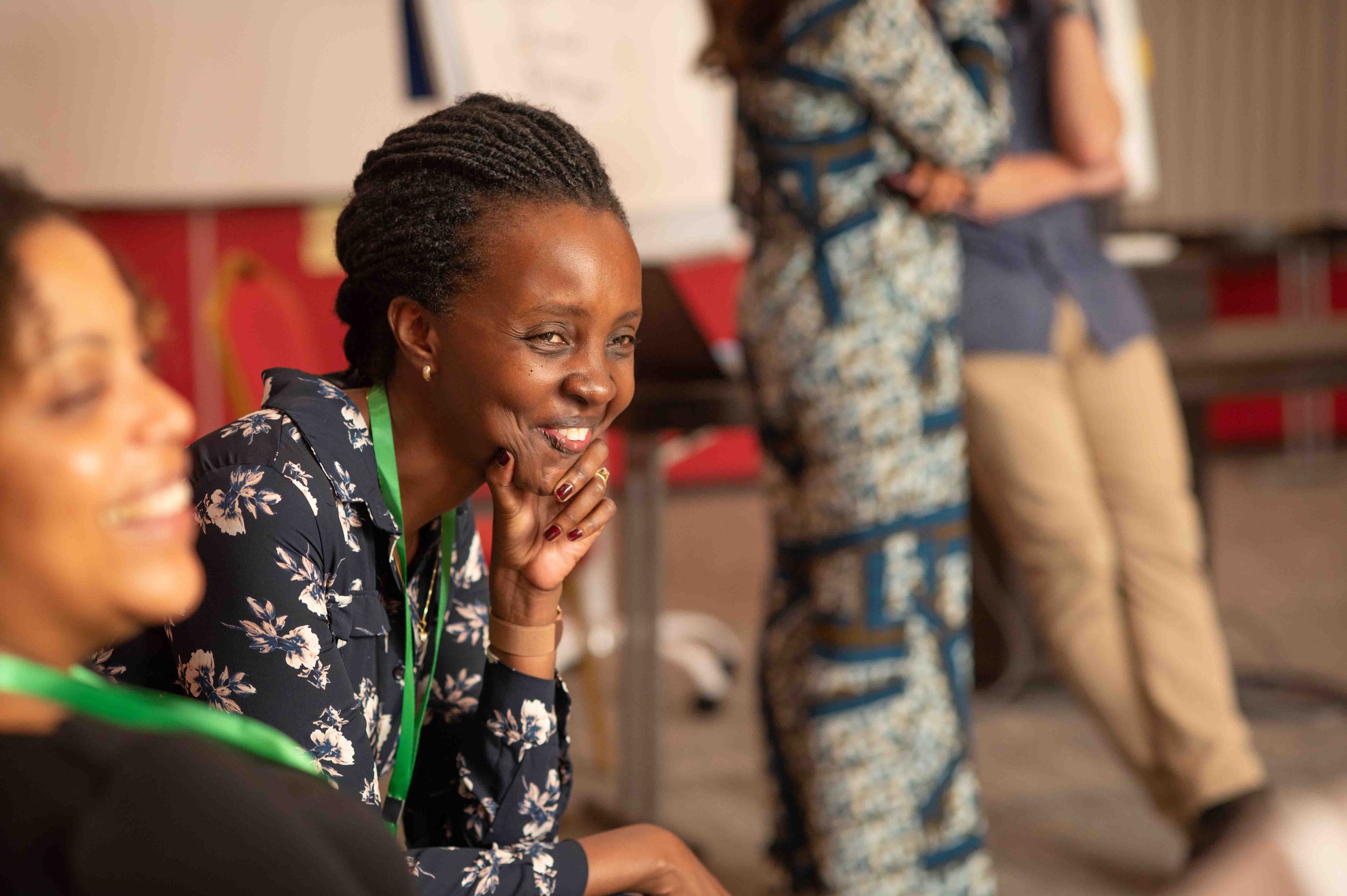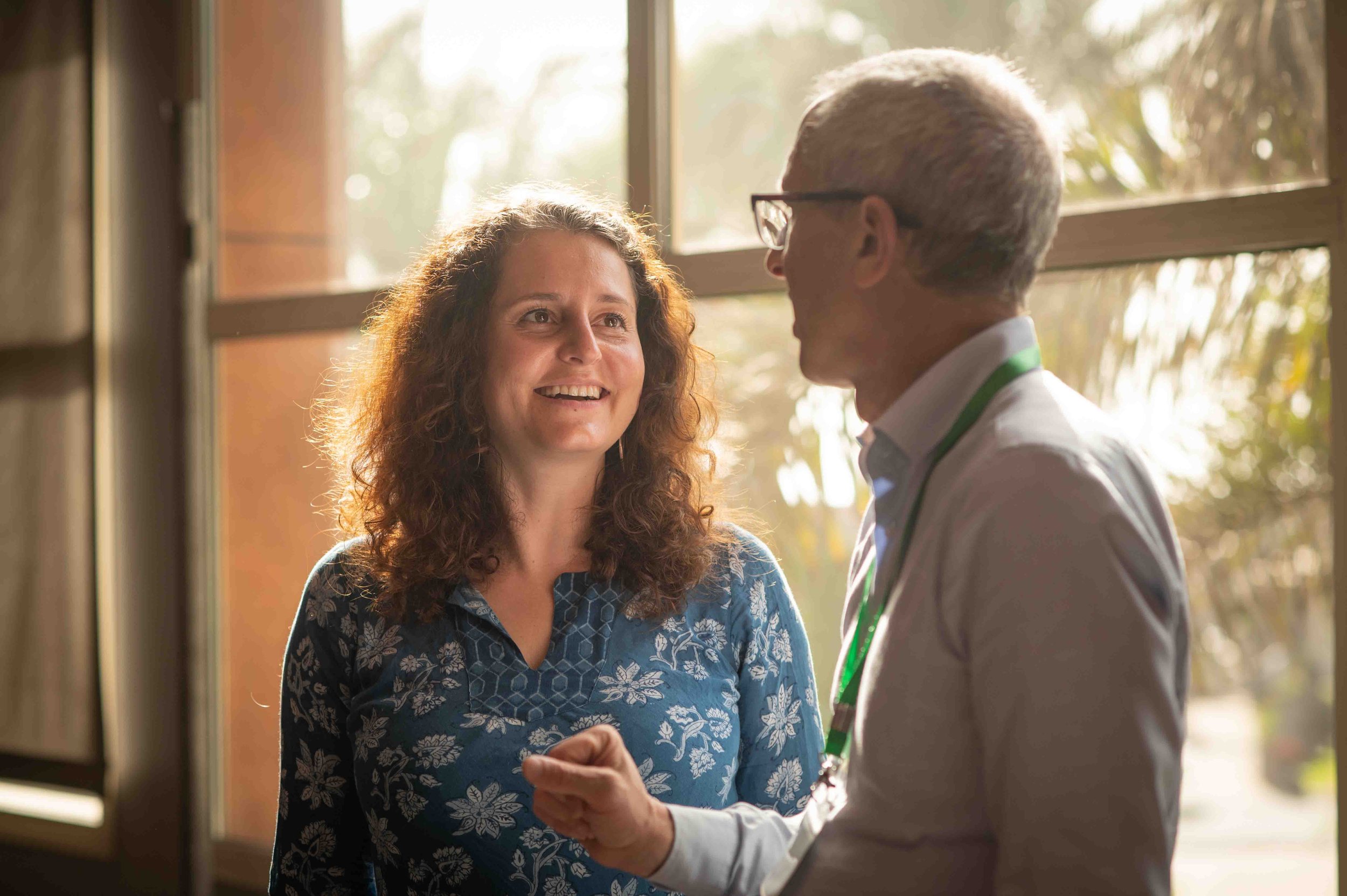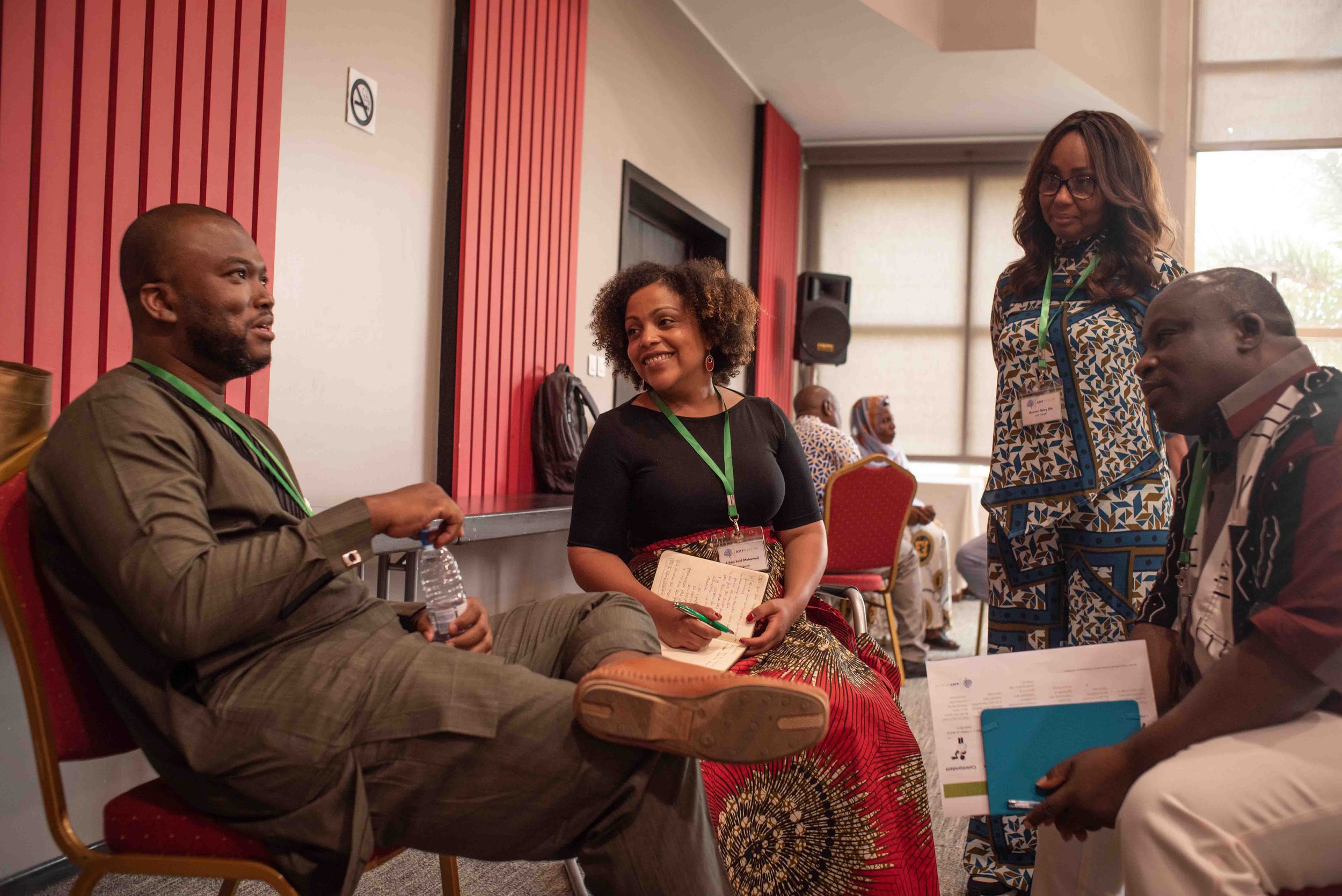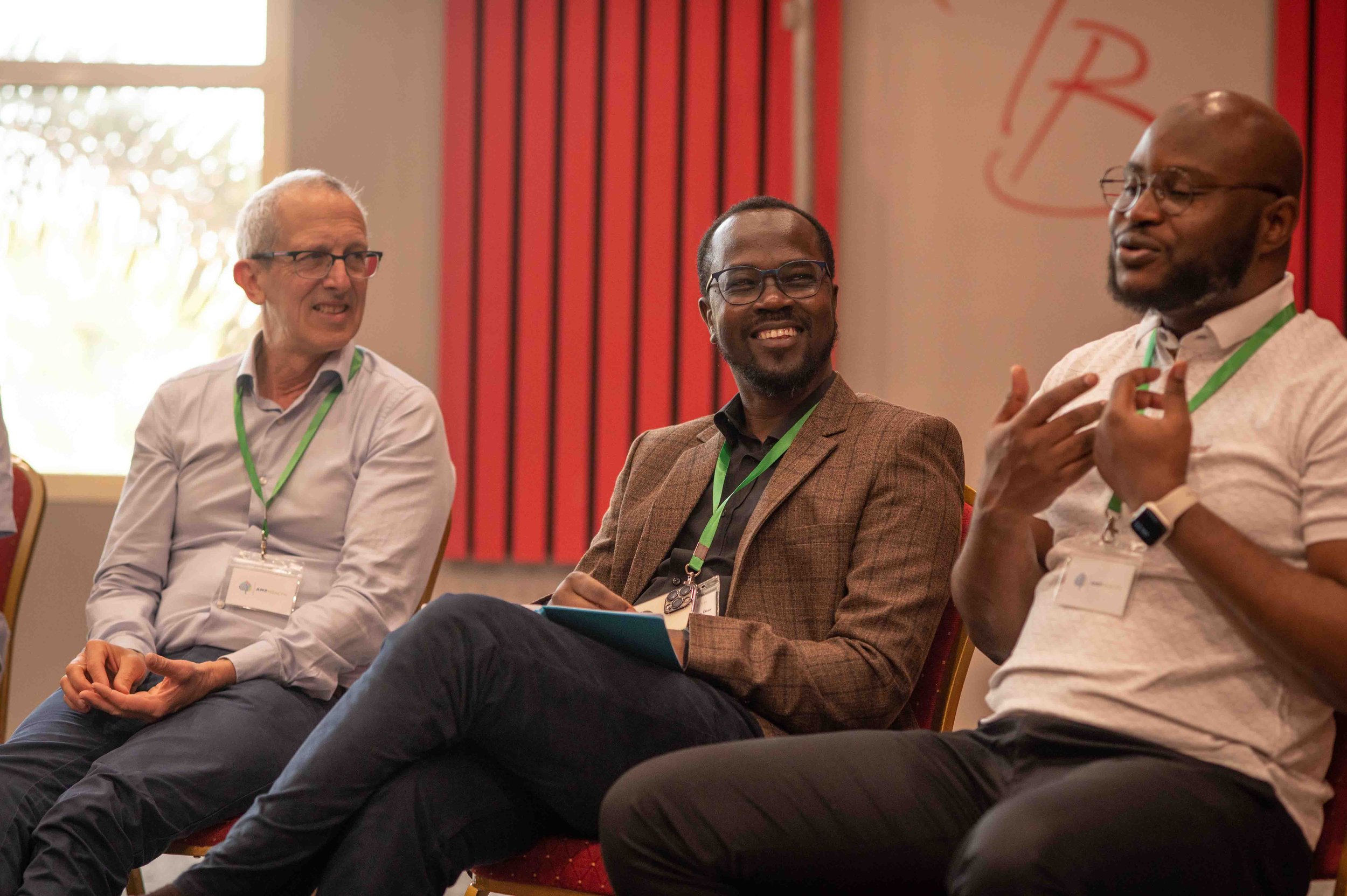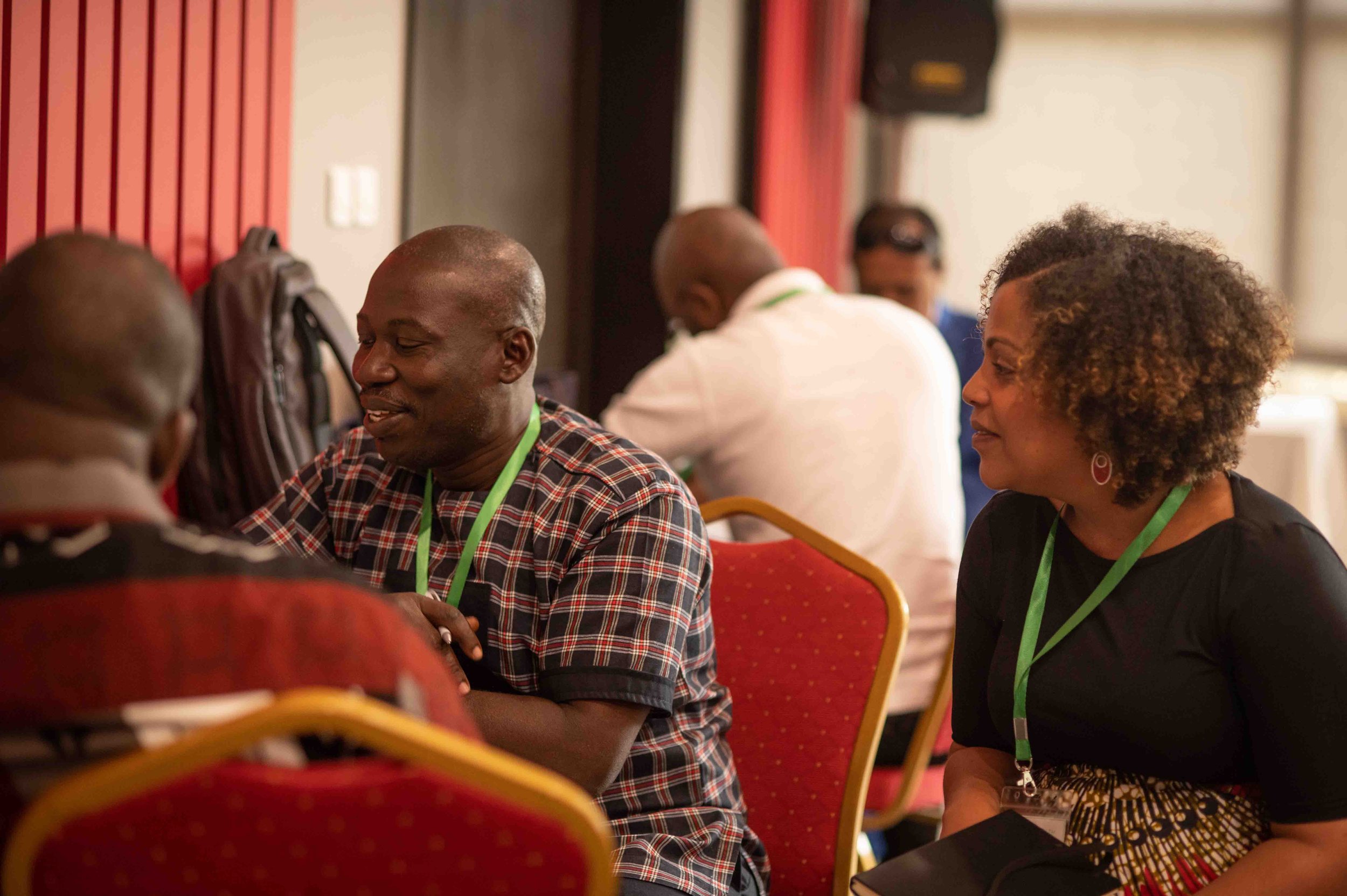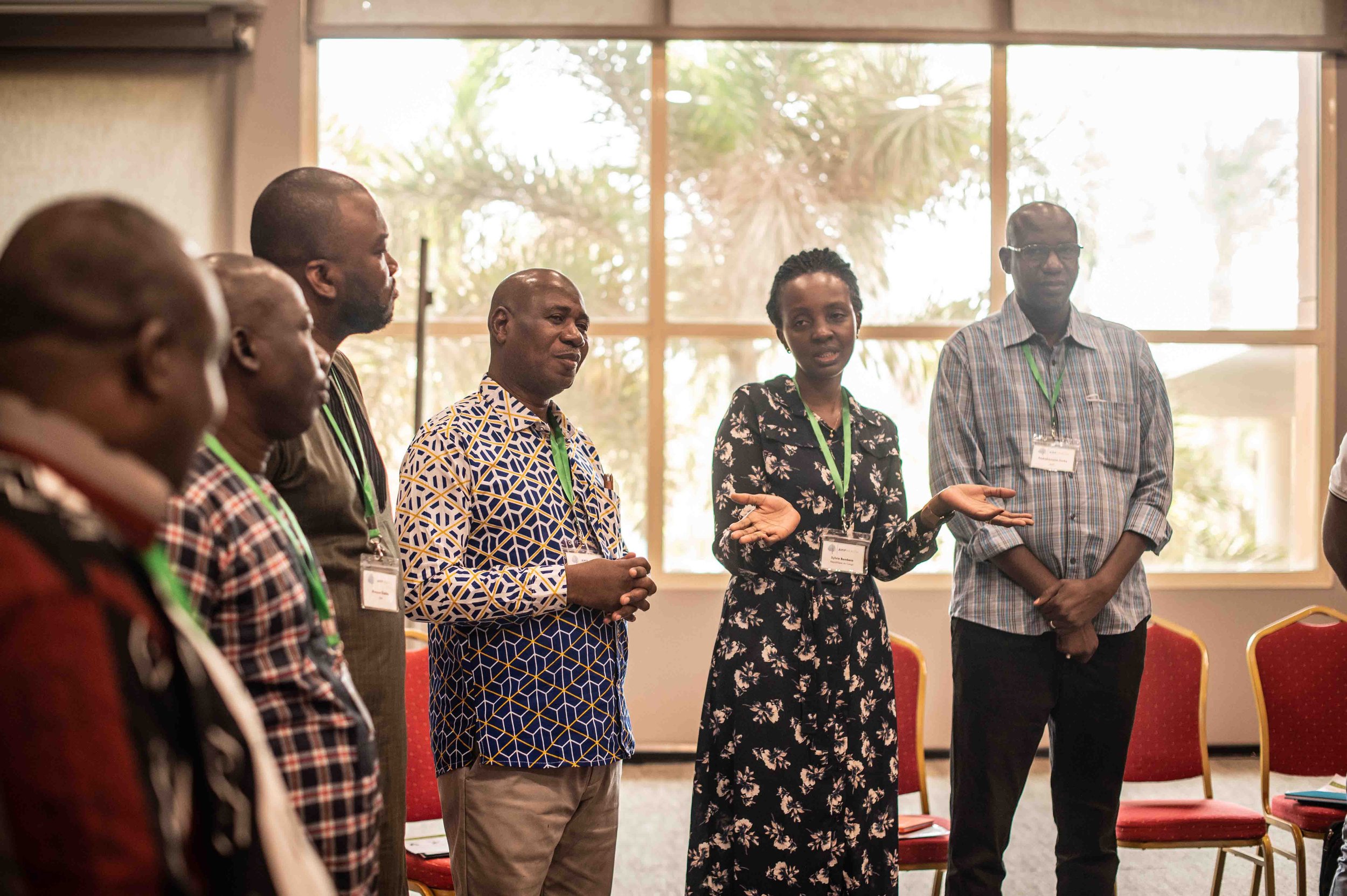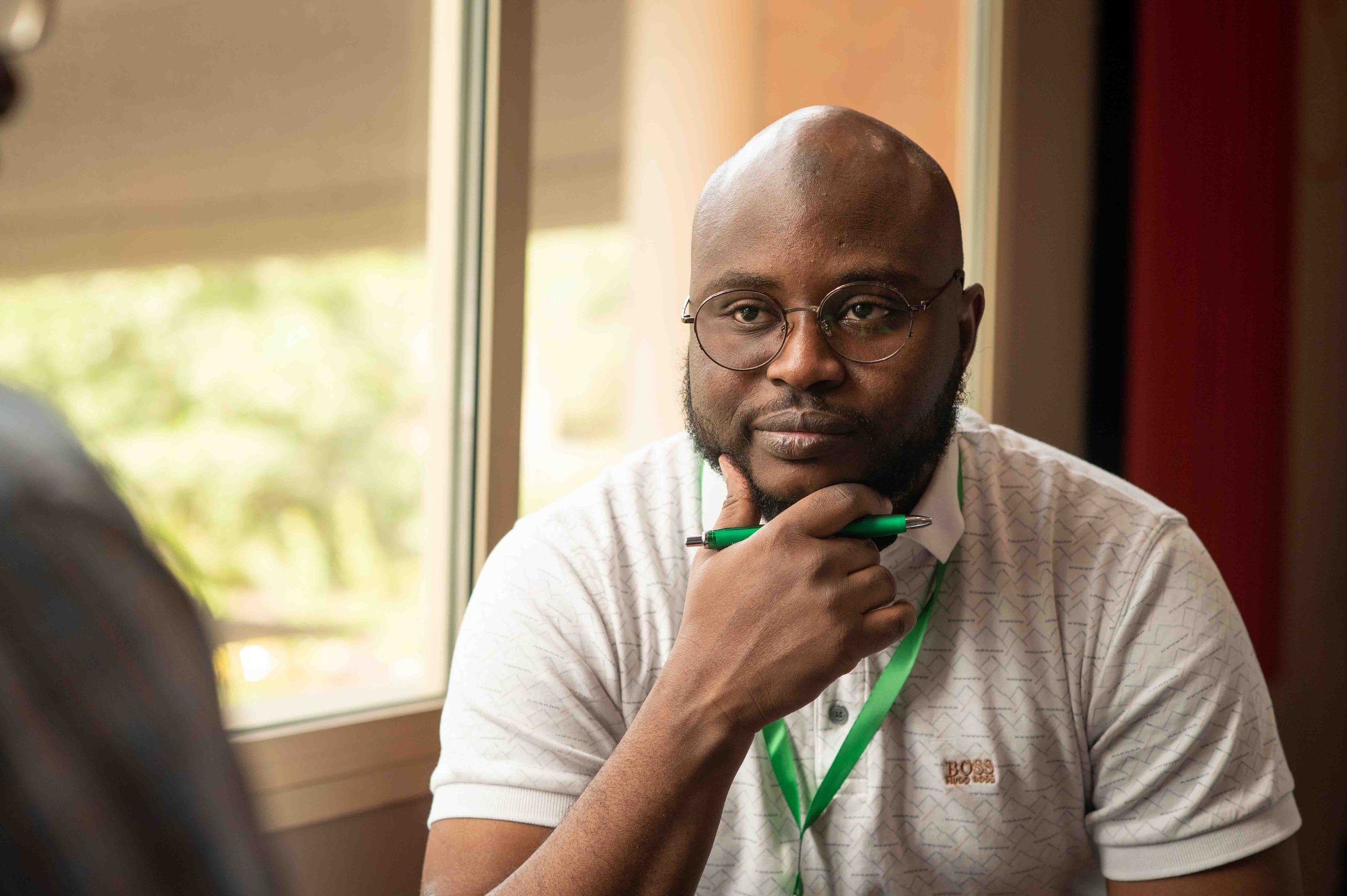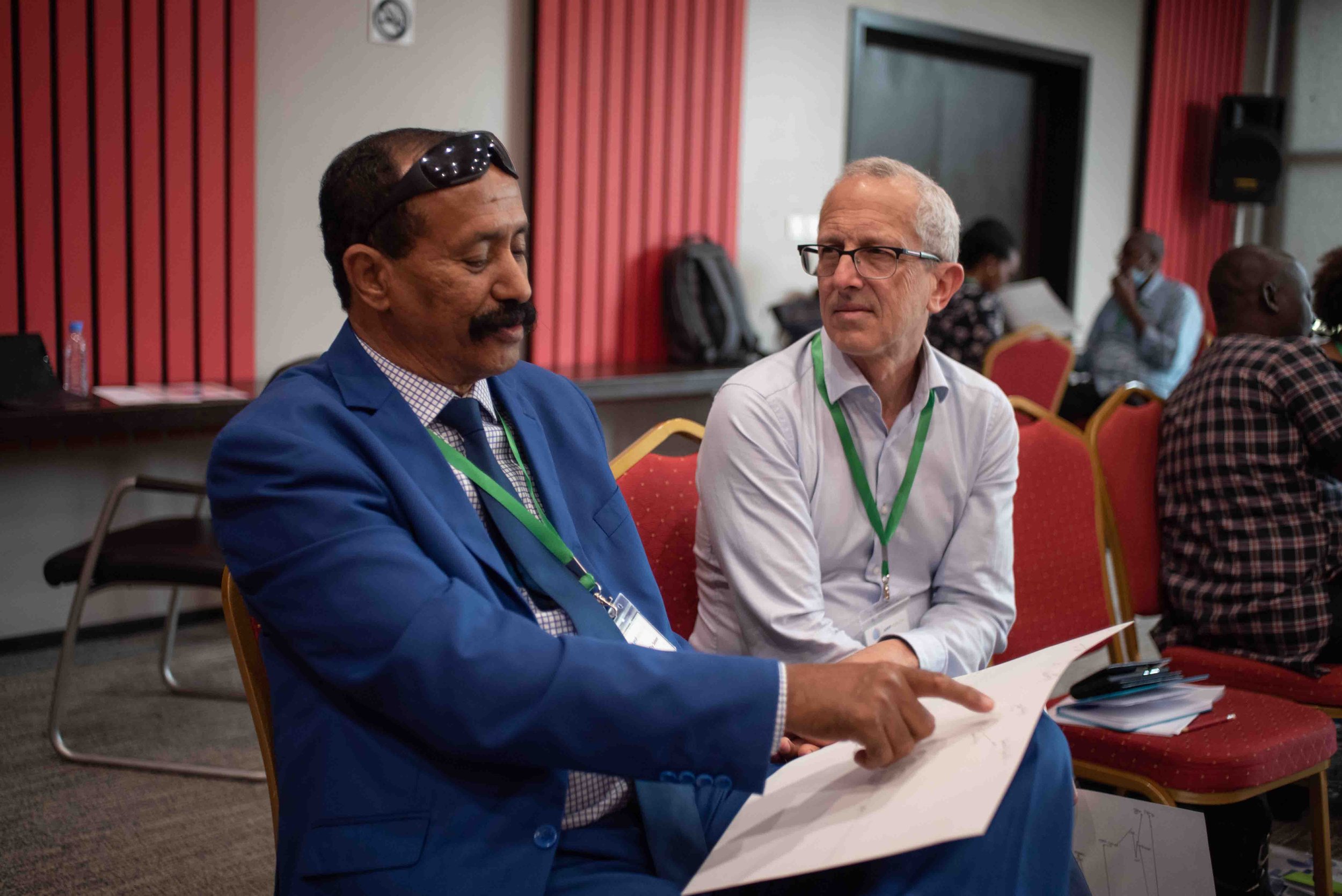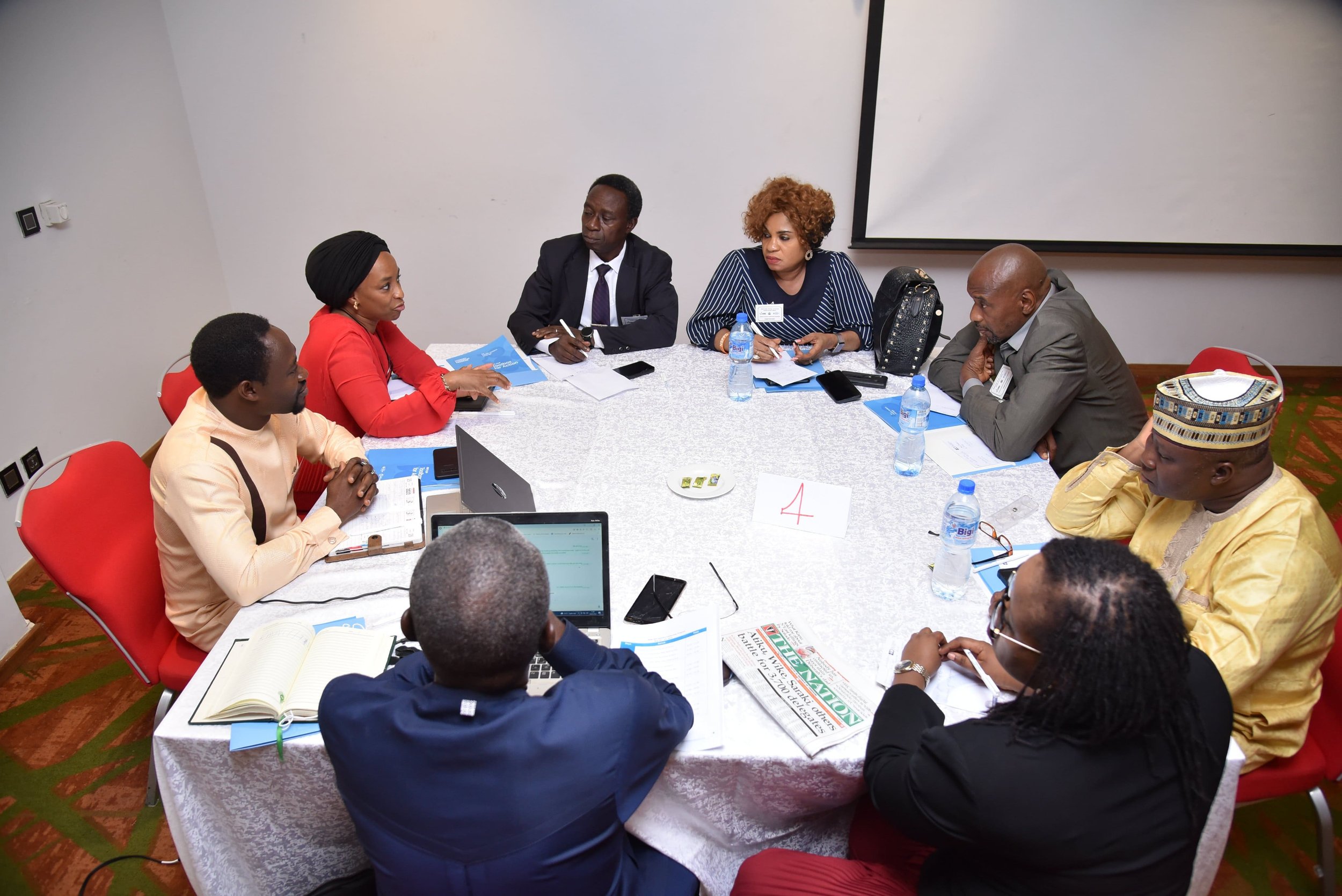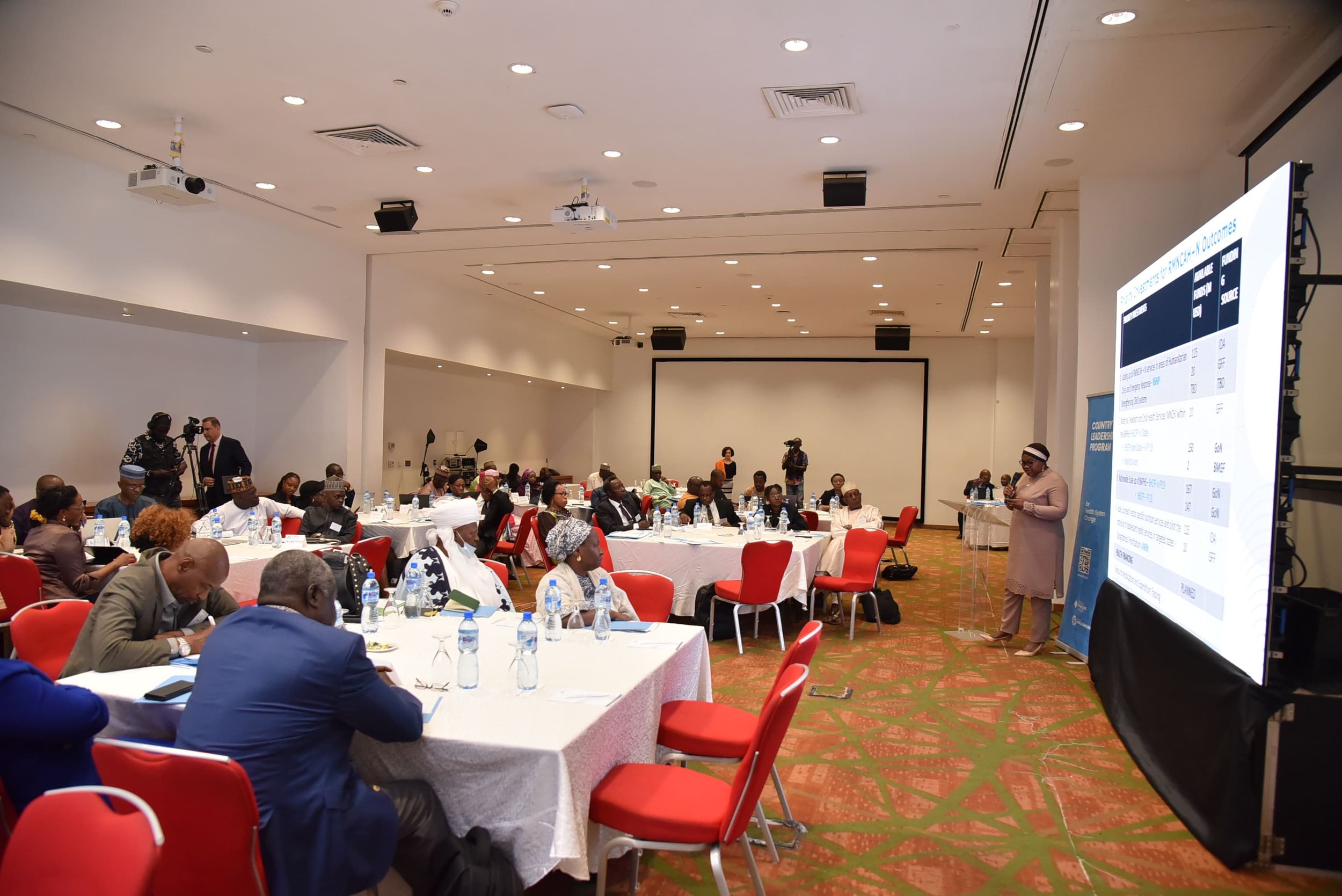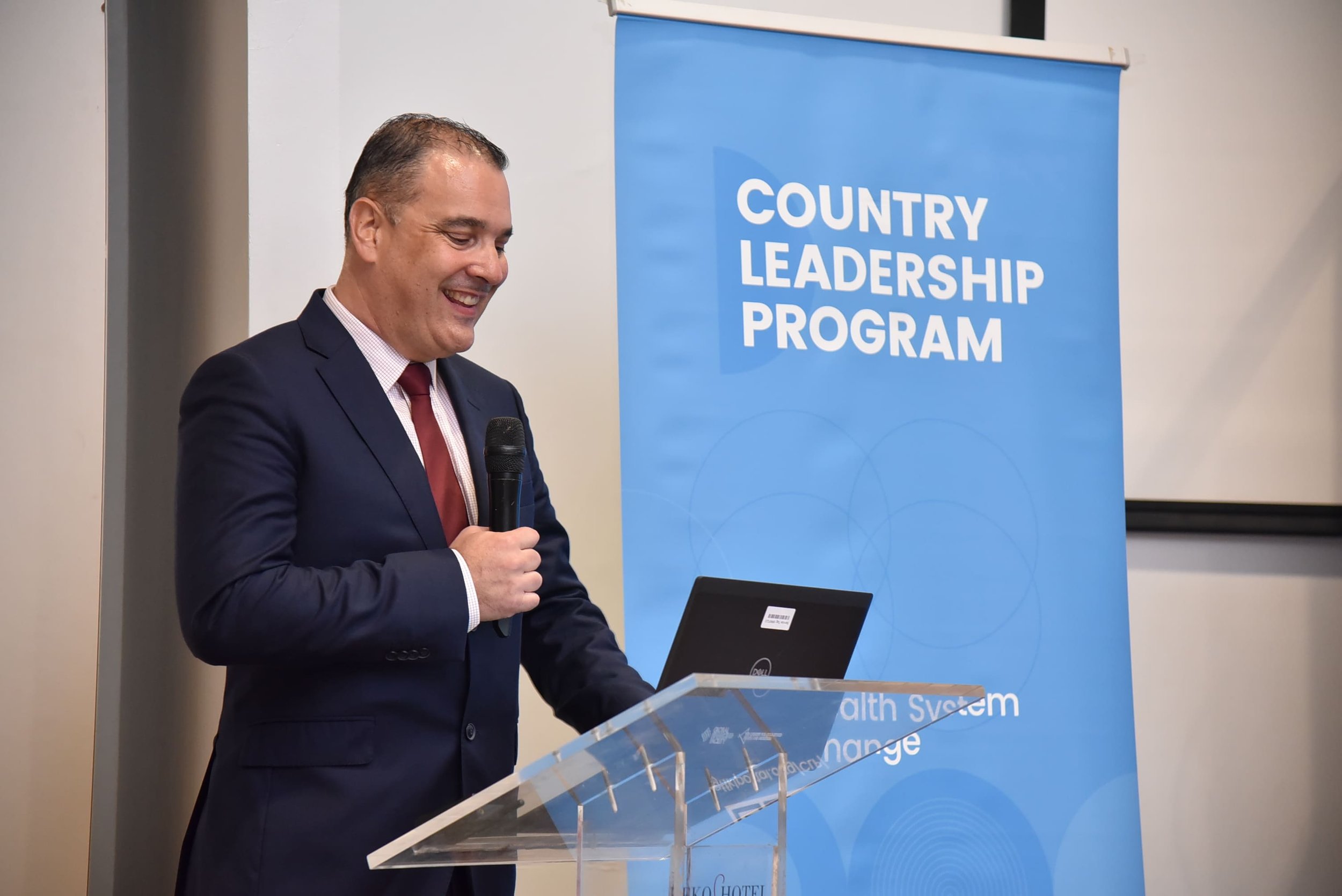Transitioning to sustainability: peer-to-peer learning with Liberia, Malawi, and Mozambique’s NCD teams
Discover how AMP Health's peer-to-peer learning and collaborative, leadership- and management-focused approach have laid a solid foundation for continued growth and systemic change in the non-communicable disease teams of Liberia, Malawi, and Mozambique.
AMP Health has partnered with three non-communicable diseases (NCD) teams since late 2021 with the support of the Helmsley Charitable Trust.
In addition to the AMP Management Partner’s (MP) embedded support, this partnership has brought the national NCD teams from Liberia, Malawi, and Mozambique together several times over the last three years to strengthen their leadership and management capabilities in a peer-to-peer learning environment.
While the teams have kept in touch, unprompted, since the first Leadership Lab, the final Lab displayed a marked commitment to ongoing learning beyond the MP’s full-time, embedded support. Held in Nairobi in February 2024, its collaborative, multi-lingual environment highlighted the power of cross-country, African-led learning.
The teams charted their way forward by setting sustainability objectives, committing to bi-annual virtual knowledge exchange workshops with each other, and planning regular in-country sessions designed to cascade national learnings to regional and district levels.
Day one:
Teams created a joint timeline of their two-year journey with AMP, acknowledging challenges and external forces, but also highlighting their agency to meet them with innovation and resilience. The participants plotted their key successes and learnings against the timeline, both as teams and individuals. This exercise in appreciative inquiry, designed to encourage self-determined change, set the teams up to envision the next stage in their learning journey.
Day two:
With the second day’s theme being ‘learning in community’, each team brought a current challenge they were facing and received thoughtful input and potential solutions from mixed groups of their cross-country peers. It was a powerful illustration of the potential for cross-team learning and sharing and stimulated a desire for ongoing dialogue between the teams. They agreed to hold two online forums in the remainder of the year organised by nominated learning champions.
Day three:
Teams drafted their sustainability objectives using SMART criteria which concretised their vision and commitment to ongoing learning. They also developed a learning action plan and nominated learning champions to keep the momentum going and nudge the team to achieve their objectives. Although the teams will drive initiatives to achieve these objectives, AMP will be on hand to provide support as required.
The AMP Health team pictured at the NCD Leadership Lab.
NCD Lab: reflections and resolutions
During the three-day lab, the teams:
reviewed their learnings and successes of the past two years, integrated and synthesised their key takeaways, and identified the most valuable learning habits and activities to nurture for ongoing growth
experienced the value and joy of learning in a community of peers through a mixed group problem-solving approach, and committed to ongoing cross-team dialogue and information-sharing
drafted sustainability objectives for their team such as SMART learning goals to ensure that their learning and growth continued after their MPs transitioned out of the team
nominated learning champions from each team to ensure their sustainability objectives would be met and to co-ordinate cross-team activities
A striking feature of the workshop was the equitable participation of English and Portuguese speakers, with the help of simultaneous translators and sessions designed to support multilingual active learning and participation. Energy levels stayed high throughout as participants worked in their country teams and in mixed groups to analyse cases, share solutions, and draft their sustainability objectives.
By reinforcing the learning and management skills acquired in the previous years, encouraging reflection and goal setting, and laying the foundation for cross-border collaboration and ongoing learning, the NCD Lab has proven to be an important step toward sustainability for all countries involved, paving the way for systemic change.
Continued success in five national malaria programmes
Explore our impactful partnerships with National Malaria Programmes in the Central African Republic, Chad, Mauritania, Namibia, and the Republic of the Congo. These collaborations have focused on enhancing leadership and management skills, leading to significant achievements such as successful grant applications and improved program management.
In our 2023 annual report, we mentioned our partnership with National Malaria Programmes (NMP) in the Central African Republic (CAR), Chad, Mauritania, Namibia, and the Republic of the Congo, made possible thanks to resources provided by USAID through the Sustaining Technical and Analytic Resources project. AMP Health’s Management Partners (MPs) support the NMPs’ ambitious objectives by working with the team on goal setting and the skills needed for successful grant application (from project scoping and budgeting to delegation, time management, and project management), providing tailored on-the-job training, and hosting in-country workshops for the senior leadership team.
In line with our dedication to the success of teams beyond the embedded phase of support, our role has shifted increasingly toward facilitating the institutionalisation of leadership and management skills and driving change well into the future. Following the success of our partnerships with various NMPs, several countries have requested a continuation of support beyond the initial partnership period, and in some countries, other teams have also requested a partnership with AMP Health.
Central African Republic: strengthening leadership, resilience, and data access
Building on the growth of managerial and strategic planning skills gained by the NMP team in the previous year, we facilitated the strengthening of the NMP team's capabilities in effectively engaging stakeholders and partners, as well as streamlining internal team coordination, collaboration, and transparent communication for the preparation of grant proposals. This effort ensured the team’s timely submission of a high-quality comprehensive grant application to the Global Fund to Fight AIDS, Tuberculosis and Malaria (GF) for Cycle 7 (with the GF serving as a critical partner in providing financial support to CAR's malaria program). The CAR team’s application was approved and awarded in October 2023.
The MP also coached the team through operational uncertainties caused by the national referendum campaign which enhanced their resilience and problem-solving skills. The CAR team faced challenges with data quality and accessibility due to fragmented systems and incomplete data, hindering informed decision-making and resource allocation. To address this, the MP engaged with the team to promote the value of quality data, facilitating discussions with stakeholders to improve data governance and integration, leading to substantial progress and enhancing the team's capacity for evidence-based decision-making and program management. Of the six partnership objectives for 2023, five were achieved while one remained on track to be achieved.
2023 team size: 15 | 2024 team size: 15
Chad: navigating complexity
Chad’s NMP team achieved significant milestones in 2023, most notably the thorough drafting of its National Strategic Plan (crucial to its ability to apply for funding from the GF) and the successful resolution of fund disbursement delays and other grant implementation bottlenecks. The MP contributed to the support of the NMP team by facilitating discussions among stakeholders, promoting regular coordination meetings both within the team and with partners, and implementing tracking mechanisms to monitor progress.
This led to improved activity execution, with the team effectively carrying out the seasonal malaria chemoprevention campaign and long-lasting insecticidal nets campaign. The digitisation pilot project of both campaigns was also completed according to schedule. The NMP team’s significant achievements and the importance of effective leadership did not go unnoticed, with the Alliance for Malaria Prevention awarding the team leader the Samuel Juana Smith Leadership Award.
The enhancements made to the NMP team's ability to communicate promptly and transparently, resolve conflicts, and restructure strategically have cultivated a more cohesive and productive working environment, enabling the team to effectively achieve many of the goals they had set for themselves. Of the nine partnership objectives for 2023, seven were achieved while two remained on track to be achieved. We believe that the Chad NMP team has made sufficient progress to transition to the sustainability phase of AMP Health's support, which commenced in January 2024 after the end of the MP’s tenure in December 2023.
2023 team size: 40 | 2024 team size: 45
Mauritania: steering through transitions and growth
Mauritania’s National Malaria Service team gained eight team members in the last year and was elevated to a fully-fledged NMP, paving the way for increased responsibility and greater resources for the team to conduct its work. Amid rapid team expansion, the MP supported the NMP team in refining the onboarding process. This included promoting the dissemination of the program's vision, mission, and essential documents to new team members; ensuring their comprehensive understanding of this vision and mission; and assisting team leaders with their approach to efficient task delegation.
In addition, the MP worked closely with the team on their stakeholder management and strategic planning skills. All these efforts ensured an efficient, effective, and successful execution of the 2023 malaria campaigns by the NMP team. Of the 10 partnership objectives set for 2023, three were achieved, six were on track to be achieved, and one was at risk.
2023 team size: 10 | 2024 team size: 18
Namibia: building resilience
Under the MP's guidance, Namibia’s National Vector-Borne Disease Control Program (NVDCP) team has demonstrated remarkable resilience and success. They prioritised team cohesion to elevate morale and strengthen relationships in the face of unforeseen staff turnover and the loss of the director of programs. Additionally, the team focused on enhancing their strategic planning, coordination, and streamlining efforts to ensure the seamless progression of projects. This allowed the NVDCP team to complete their previous strategy’s end-of-term review and formulate their new National Malaria Elimination Strategic Plan ahead of their GF grant application.
Furthermore, the MP coached the team to enhance their stakeholder management, conflict resolution, communication, and decision-making skills enabling them to effectively navigate challenging discussions with stakeholders and cultivate stronger alignment and collaboration with key partners. This growth ensures the NVDCP team is on a positive trajectory having transitioned to the sustainability phase at the end of 2023. Of the four partnership objectives for 2023, three were on track while one was at risk.
2023 team size: 6 | 2024 team size: 10
Republic of Congo: strengthening leadership and bolstering resilience
Over the past two years, the Congo NMP has experienced significant growth, doubling in size. The introduction of a new team lead last year underscored the necessity for heightened organisational resilience, coordination, and collaboration. The MP collaborated closely with the NMP team to facilitate the onboarding and transition of the new team lead. He coached them in the creation of a comprehensive onboarding structure for incoming team members, in assessing roles and responsibilities to maximise team effectiveness, and in the revision of the team’s Manual of Procedures. These initiatives resulted in streamlined internal processes, reinforced governance practices, and strengthened leadership and management capabilities among department heads.
Consequently, decision-making, people management, delegation, collaboration, and collective accountability have all been markedly improved. In addition, the NMP team successfully applied for their next GF grant, and were awarded funding support starting in January 2024. With coaching from the MP, the team formulated an innovative communication strategy aimed at disseminating malaria prevention messages by leveraging social media platforms and distributing materials at health facilities to effectively increase the NMP’s visibility and reach the target audience. Of the nine partnership objectives for 2023, four were achieved and five were on track to be achieved.
2023 team size: 32 | 2024 team size: 35
The road to 2030: AMP Health’s refreshed strategy
Explore our new strategy aligned with the UN's 2030 Agenda, which emphasizes an intersectional approach to health and wellbeing. This strategy guides our vision of supporting African governments in fostering visionary teams and honing leadership skills for a brighter, sustainable future.
As we embark on the next phase of our journey at AMP Health, we stand at a pivotal moment of reflection and renewal. The conclusion of our previous 5-year strategic period has prompted us to reassess our approach, aligning it with the global imperative set forth by the United Nations' 2030 Agenda and its Sustainable Development Goals (SDGs). Recognising the interconnected nature of today's challenges, our updated strategy looks beyond primary healthcare alone and makes way for an intersectional approach by prioritising, promoting, and protecting the health and wellbeing of people and the planet.
As countries grapple with the impact of climate change, governments will need to look toward their central role in building resilient societies, and to do so requires the collaboration of different sectors. This compels us to examine other issues that intersect with healthcare and lend our support to the dismantling of siloes within and across sectors such as agriculture, education, youth, and the environment. We recognise that healthcare is a broader concept than the sum total of individual programmatic areas of health, and that many solutions to healthcare issues lie outside the scope of ministries of health, thereby highlighting the importance of intersectionality.
Our mission has also undergone a significant change, moving away from a sole focus on improving health outcomes, to one that is dedicated to supporting African governments to build visionary and effective public sector teams. AMP Health aims to accomplish this by helping these teams develop the leadership and management skills needed to realise ambitious goals.
Central to our approach are core principles of African focus, transparency, collaboration, agility, and intersectionality. These principles underpin every facet of our work, ensuring that our actions are aligned with the best interests of our government partners and the communities they serve. The last five years have demonstrated that our model works and that mentorship and coaching of teams – particularly embedded mentorship and coaching – yields extraordinary results in improving teams’ abilities to achieve their goals.
With this success in mind, our strategic goals have been largely retained but with amendments that reflect our new approach. While embedded coaching and mentoring remains integral to our model, we also recognise the importance of fostering a culture of continuous learning and knowledge sharing beyond the initial phase of support. To this end, we are reallocating resources to prioritise sustainability planning from the outset of our engagements, catalysing enduring change within public sector teams.
By equipping public sector teams with leadership and management skills, we are laying the groundwork for transformative change in the health sector and beyond. As we forge ahead, our focus remains steadfast on building capacity and fostering collaboration for countries to achieve their Sustainable Development Goals. Together with our partners, we are shaping a future where resilient and visionary public sector teams propel Africa towards an even brighter, more sustainable tomorrow.
To view our 2030 strategy in full, click here.
Supporting Ghana’s ambitious plans to lower maternal mortality rates through local innovation
Explore how a groundbreaking multisectoral partnership led by the Ghana Health Service is reshaping healthcare innovation. It aims to solve current health challenges and set a precedent for African-led innovation that can be replicated continentwide.
Ghana’s maternal mortality rate has experienced a sustained downward trend in recent decades, with its 2015 ratio down to 319 per 100,000 live births from 760 in 1990. Despite these successes, progress has slowed and last year showed a slight increase, prompting the need for additional solutions if Ghana is to meet its commitment to the UN’s 2030 Sustainable Development Goal (SDG) of fewer than 70 deaths per 100,000 live births.
In our 2023 annual report, we announced a new partnership between the Ghana Health Service (GHS), USAID, Grand Challenges Canada (GCC), and AMP Health known as the Country Innovation Platform (CIP). It aims to improve maternal and newborn health outcomes by identifying and investing in African innovations tailored to local needs.
African countries are often compelled to adapt innovations from elsewhere around the globe. Often, these are ill-suited to local contexts. The CIP stakeholders entered the co-creation workshop aware that the best solutions to Ghana’s healthcare issues were more likely to be found in local ideas and innovations.
The CIP kicked off with a co-creation workshop, co-designed and co-facilitated by AMP Health and its partners, and brought together public and private sector representatives, along with other stakeholders such as funders and innovators. This workshop helped build trust, prompted collaboration and thought sharing between stakeholders, and resulted in the identification of high-priority maternal and newborn health needs that would guide the selection criteria when evaluating innovations. Four outcome goals emerged.
These are:
Improved communication and real-time tracking of information along the patient referral journey for mothers and newborns
Increased accessibility and availability of transport for pregnant women and mothers of newborns who need to reach facilities, especially in emergencies
Improved skills of healthcare workers to deliver high-quality emergency care for mothers and newborns
Increased availability of essential medicines and supplies for mothers and newborns when needed
Following the two-month co-creation process starting in February 2023, a request for proposals was issued, seeking the ingenuity of innovators and thought leaders from across Africa. Over the following months, more than 135 proposals were received, of which eight were selected after a screening process. Negotiations are currently being finalised with the selected candidates ahead of the roll-out of the pilot period.
AMP Health’s Management Partner in Ghana, Chioma Ogbozor, has been embedded in the GHS to support the establishment of the CIP by providing ongoing training and direct mentorship to team leads and team members who have not held leadership positions before. She has also been guiding the team on building relationships between stakeholders, developing project management skills, and coaching the team to convene discussions and set agendas, thereby minimising delays and improving efficiencies.
Chioma Ogbozor, AMP Health’s Management Partner, speaking at the co-creation workshop.
To ensure the continued identification of potential innovations in the health sector, Chioma coached the team through the steps needed to establish an innovation desk, and in the selection process of team members to staff the desk. This centralised hub now acts as the first point of contact for guidance, collaboration, and expertise in healthcare innovation.
The CIP has reshaped Ghana’s approach to health innovation by departing from current global healthcare innovation norms, which have to date largely been led by funders and international partners. This novel approach has ensured the GHS remains the key decision maker, places local partners at the forefront of the innovation process, and seeks appropriate solutions to country-specific issues through multisectoral collaboration.
The CIP not only aims to address the healthcare challenges faced by the GHS, mothers, and their newborns but also acts as an innovation process model that can be replicated to address similar challenges elsewhere on the continent, while simultaneously fostering growth through investment in African health innovators.
Institutionalising leadership and management development for sustainable change
Discover how institutionalizing leadership and management development is driving sustainable change in Ghana and Zambia's public health sectors. AMP Health's partnerships are catalyzing investments in leadership skills at an institutional level, leading to systemic improvements in public sector institutions and better community service.
When we start a partnership with a public sector team, we aim to help them improve as managers and leaders. This will help them achieve their goals. But our goal is bigger. We want to bring about systemic change at an institutional level. Recently, we have been partnering with senior levels of public health institutions to find ways that we can not only support individual teams to work together more effectively, but also to create long-term investments in developing these skills at an institutional level.
In Ghana and Zambia, we have been working closely with senior health officials to support them in conceptualising ways in which they might institute their own leadership and management development (L&M) programmes and catalyse investment in these crucial skills. These investments will contribute to more effective public sector institutions that are better able to achieve their own goals and serve their communities.
Ghana
Since then, GHS has requested two additional AMP partnerships, one to develop regional health leadership in Ghana’s six newest regions, and another to support the establishment of a Country Innovation Platform that will identify promising health innovations and roll them out at scale across the country. Given our experience working with multiple teams in the GHS to strengthen L&M skills, we have also acted as a thought partner to senior health officials on the approach taken by the GHSI.
The Deputy Director General of the GHS, Dr Anthony Ofosu, led the establishment of the GHSI. Dr Ofosu had benefited from coaching and mentoring throughout his career and saw AMP Health’s way of learning by doing as a new way to develop GHS leadership. As a result, he sought AMP Health’s support in informing the institute’s design and approach. AMP continues to work with the GHS on the GHSI today while the GHS uses insights from its partnership with AMP Health to refine its approach to the GHSI. We are excited to see the launch of their first service-wide programme for mid-level managers in late 2024.
Zambia
AMP Health has been a key partner to the Global Financing Facility’s Country Leadership Programme (CLP). The CLP brings together senior leaders from the Ministry of Health (MoH), academic institutions, non-governmental organisations, and the private sector. The goal of the CLP is to support governments receiving GFF funds to improve their coordination and leadership to address health system challenges that impact reproductive, neonatal, maternal, and child health. Having successfully supported the CLP team in Nigeria from 2022 to 2023, AMP was asked to be part of the programme in Zambia.
During the kickoff leadership workshop for the Zambia CLP, participants identified the institutionalisation of L&M development for the health sector as a key priority. The participants were organised into three multi-sectoral working groups named after the Luena, Lukulu, and Lunzua rivers in Zambia. Each group was tasked with a different component of the institutionalisation plan.
The Lunzua group focused on the development of a standardised L&M curriculum, with the aim of including this into existing training for health workers and civil servants. Meanwhile, the Lukulu group focused on managing relationships with training institutions such as universities to secure their buy-in and ensure that the new curriculum could be incorporated into existing courses. Lastly, the Luena group were tasked with finding ways to reach existing health workers and develop their L&M skills on the job as part of the MoH’s staff engagement efforts.
Since then, two training institutions, the National School of Government and the Lusaka Apex Medical University, have committed to leading the curriculum development process. Once this curriculum has been finalised, it will be rolled out through universities, nursing colleges, and other public health training institutes throughout the country.
Throughout this process, AMP Health has played a key coaching, mentoring, and facilitation role, guiding the working groups to develop strategies, define roles and responsibilities, and effectively communicate with key stakeholders. What started as a programme for a small group of leaders to build their L&M skills, has now turned into a system-wide transformation project with broad support from senior officials within the MoH. The Assistant Director of Human Development in the MoH and the Director of the National School of Government both sit on the secretariat for this institutionalisation project and are actively taking steps towards making the new curriculum a reality.
In Ghana and Zambia, the government has embraced the transformational power of investing in L&M development within public sector teams. By institutionalising these efforts, both countries are not only enhancing their immediate capabilities but also laying the groundwork for long-term systemic change. Ghana’s GHSI demonstrates a deep-rooted dedication to building effective teams while Zambia's collaborative approach to integrating L&M training into existing structures shows how to make effective and efficient use of available resources. As these countries continue to invest in enhancing the L&M capacities of public sector teams, they serve as models for other countries on how investing in people is synonymous with investing in progress.
Beyond good intentions: what will it take to end malnutrition in Nigeria?
Two-fifths of children under the age of five face chronic malnutrition in Nigeria. Find out more about the challenges faced, the potential solutions available, and the role of leadership and management in combatting these issues.
Words by Dr. Shola Dele-Olowu
West African Programme Manager, AMP Health
In Nigeria’s federal capital city, Abuja, many residents are familiar with the services provided by street cleaners, often undertaken by young women who clean Abuja’s busy highways and streets in serviced estates. One such lady is Mama Miracle, so named after her 16-month-old son, Miracle, who she carries on her back every morning while cleaning the streets in my neighbourhood. It is difficult to ignore the signs of malnutrition in baby Miracle.
Baby Miracle represents a silent struggle that plagues countless families. It is the fight against hunger and malnutrition often ignored amid the chaos of the everyday bustle. This situation is not peculiar to Mama Miracle’s family. Across Nigeria, millions of families grapple with food insecurity and malnutrition, with two fifths of children under five years of age suffering from chronic malnutrition. While poverty is the root cause of this crisis, it has been exacerbated by climate change, lack of access to quality healthcare and education, and poor infrastructure. Despite the complexity of the problem and the adversity families face, there are glimmers of hope.
Addressing food insecurity and improving nutrition
In recent years, the Nigerian government has launched various initiatives to address food security and improve nutrition. In health and agriculture, sector-specific plans have been developed to address malnutrition. For instance, the National Multi-sectoral Plan of Action for Food and Nutrition has set a goal to attain optimal nutritional status for all Nigerians, with a focus on the most vulnerable – especially women and children. The central strategies of the masterplan focus on ensuring food and nutrition security, enhancing health services, and safeguarding consumers with quality and safety measures. Additionally, it aims to tackle food insecurity, promote a favourable economic environment, raise awareness of malnutrition, and ensure efficient resource allocation for food and nutrition security at all levels.
Another example is the Accelerating Nutrition Results in Nigeria (ANRiN) project, which focuses on 12 states with high malnutrition rates, home to more than 41% of Nigeria’s almost 15 million stunted children. Funded by the World Bank, ANRiN aims to increase the utilisation of cost-effective nutrition services for pregnant and lactating women. It has garnered unprecedented multisectoral collaboration among the government’s finance, health, women affairs, education, agriculture, and rural development ministries, alongside non-government stakeholders, to help ensure the country addresses the scourge of malnutrition.
Despite these commendable efforts, Nigeria is not remotely out of the woods yet. How can Mama Miracle feel secure about improving her child’s nutrition? The World Food Programme estimates that more than 26 million people in Nigeria will face acute hunger in 2024’s lean season (the period between harvests, running from May to August each year) due to rising inflation, the impact of the climate crisis, and food insecurity.
The role of leadership and management in tackling malnutrition and food insecurity in Nigeria
As a mother who does everything to ensure my children get all the nutrients they need, I cannot help but be burdened by the many baby Miracles and their mothers living in uncertainty about the source of their next nutritious meal. Nigeria’s National Policy on Food and Nutrition has stated that “effective institutional coordination is required” to ensure its nutrition programme is successful, acknowledging deficiencies in understanding what needs to be done and effectively implementing nutrition programs within the healthcare system.
For Mama Miracle and baby Miracle, hope lies in the transformative power of leadership to ensure that strategic plans are fully and effectively implemented, and commitments are honoured. The government must act decisively and urgently to address the pressing issues of food insecurity and malnutrition faced by Mama Miracle and millions of other Nigerians.
Providing affordable nutrition services – especially those focused on maternal newborn and child health – should be a top priority to improve health care. It is also essential to intentionally increase public awareness of malnutrition and include nutrition education in school curricula. The Federal Ministry of Finance, Budget, and National Planning’s support is paramount given its coordinating role in driving multisectoral collaboration in the interest of nutrition and food security.
Initiatives focusing on leadership and management – like the partnership between the Nigerian government, AMP Health, and the Global Financing Facility for Women, Children, Adolescents – help ensure the effective delivery of quality healthcare to women and children while ensuring gains made through nutrition initiatives are sustained and maximised.
In a country with abundant natural resources, the irony of food insecurity is a bitter pill to swallow. Though the road ahead may be fraught with challenges, I am hopeful that with all the investments and efforts of the Government of Nigeria, a future where every child in Nigeria has enough food to eat and the opportunity to thrive is achievable. The time to act is now and the stakes cannot be higher. Addressing malnutrition in Nigeria requires more than just good intentions; it demands decisive action and visionary leadership.
Breaking Barriers: Liberia leading the way in the fight against diabetes
In a world where non-communicable diseases (NCDs) pose a significant threat to public health, Liberia's Ministry of Health has made remarkable strides in the fight against these silent killers. Thanks to the unwavering commitment of the Liberia Non-Communicable Diseases Team, the country is stepping up its game in managing Type 1 diabetes (T1D) and other NCDs.
In a world where non-communicable diseases (NCDs) pose a significant threat to public health, Liberia's Ministry of Health has made remarkable strides in the fight against these silent killers. Thanks to the unwavering commitment of the Liberia Non-Communicable Diseases Team, the country is stepping up its game in managing Type 1 diabetes (T1D) and other NCDs.
AMP Health, with the generous support of the Leona M. and Harry B. Helmsley Charitable Trust, has played an important role in supporting the team to advance their work through better leadership and management practices. The partnership with the Liberia Ministry of Health forms part of a $3 million, three-year grant from Helmsley to AMP Health aimed at strengthening leadership and management skills in teams responsible for managing Type 1 diabetes (T1D) and other NCDs in Liberia, Malawi, and Mozambique. The grant empowered AMP Health to provide crucial support to public sector teams, fostering the development of essential leadership and management skills necessary to achieve their goals.
Zoe Doe of the Liberia NCD team
One of the standout achievements of the Liberia NCD team, supported by the coaching and mentoring of the embedded AMP Health Management Partner, was the development of clinical guidelines for diabetes management. Recognising that the guidelines in use were outdated, the team set out to develop new guidelines that would contribute to better management of diabetes throughout Liberia. They sought insights from a pool of experts, developed a comprehensive draft, and engaged in a series of sessions to revise and validate the guidelines.
AMP Health played a crucial role in this process, offering targeted training on structuring guidelines, consolidating feedback, and editing documents into a publishable format. The training, involving key ministry officials, consisted of eight workshops and interactive learning sessions to build the team’s skills in planning, project management, stakeholder engagement, and communication. The new guidelines are expected to standardise the treatment of type 1, type 2, and gestational diabetes across the country, and will be distributed to over 875 health facilities in Liberia.
In another significant accomplishment, the NCD team successfully centralized the coordination and reporting of insulin distribution, a critical component of Type 1 Diabetes management. The initial challenge of inadequate tracking and direct dealings between donors and health facilities was resolved through the dedicated efforts of the Diabetes Coordinator, Mr Denis Kamba. AMP Health's contribution in training Mr Kamba on communication with development partners, drafting Memoranda of Understanding, and consolidating insulin data proved instrumental in this process.
The Liberia NCD team attending the AMP Health Leadership Lab in Maputo, Mozambique
As a result, the Ministry of Health now has oversight of insulin supplies, ensuring quality, efficiency, and effectiveness in the distribution process. The transition from direct donor dealings with hospitals to managing insulin supplies through the Ministry of Health has provided crucial visibility into insulin usage, types, quality, and quantity at hospitals across Liberia.
These achievements underscore the impact of strategic partnerships in addressing the growing burden of non-communicable diseases. The Liberia NCD team's dedication, coupled with AMP Health's support and Helmsley's generosity, showcases the potential for positive change in public health systems, ultimately leading to better care and healthier communities.
What is an AMP Health Management Partner?
The Management Partner is at the heart of the AMP Health model. But what exactly is a Management Partner and how do they contribute to making the AMP model a success?
What is a Management Partner?
An AMP Management Partner, typically a mid-career professional with private sector experience, is embedded within a government team, usually for a minimum of two years. They serve as coaches and mentors, aiding the team in identifying critical programmatic priorities and the necessary leadership and management skills to achieve these goals.
How is a Management Partner different to a technical advisor?
It is important to differentiate a Management Partner from a technical advisor. Technical advisors are generally subject matter experts who provide guidance and quality assurance within their fields of expertise. In the health sector, technical advisors are often medical doctors, nurses, or public health specialists. In some cases, they conduct work on behalf of a government team that might not have the capacity to do it themselves. By contrast, Management Partners focus on enhancing team effectiveness and capacity to deliver on their strategic goals and workplans, rather than directly performing tasks for the team.
What does a Management Partner’s day-to-day work look like?
AMP Management Partners are embedded in ministry of health teams. Most are based at national ministries of health and act as coaches and mentors to the teams within which they are embedded. At the beginning of all new partnerships, Management Partners focus on establishing a foundation of trust with their teams and understanding their goals and priorities. Within the first few months of their placement, the team, with the support of the Management Partner, decide what leadership and management skills they need to develop to achieve their goals, and based on that they jointly develop a set of partnership objectives to guide their work together.
Specific focus areas for the Management Partner depend on the goals of the team, but are drawn from the AMP Health Catalog of Competencies, and often include supporting the team to improve strategic planning; prioritisation; the use of data for decision-making; programme design and work planning; financial modeling and investment cases; coalition building (including with the private sector); and guidance on governance and coordination across the MoH.
Management Partners also work closely the AMP Health Learning Team to determine the most context-appropriate approaches based on the latest science of team-based adult experiential learning, for developing the relevant leadership and management capabilities, and to identify relevant content to help teams on their leadership and management journeys.
What qualifications do Management Partners need to have?
Our Management Partners come from a wide range of backgrounds. While a few have previous public health experience, others have worked in logistics, project management, banking and finance, management consulting, and other professions. We hire individuals with exceptional problem solving and analytical abilities and an ability to cultivate trust with team members ranging from junior staff to executive leaders.
Management Partners do not have any formal authority within the teams they support. They do not issue directives or instructions. Rather, they support the team by building their leadership and management capabilities and offering advice on how to improve ways of working. To be effective, Management Partners must therefore be able to influence these teams without having a formal position of authority. We look for character traits like curiosity, flexibility, humility, patience, gravitas, resilience, and sense of humour that enable individuals to build the trusting relationships needed to succeed in this role. These abilities and character traits are far more important than formal qualifications.
Why does AMP use this approach?
Leadership and management skills are essential for developing and implementing robust and resilient health systems. These skills drive effective planning, implementation, monitoring, and evaluation of health innovation efforts, fostering innovation and continuous learning.
We aim to provide our partner teams with a broad set of management tools and techniques and coach them through adapting these to their own context. We aim to provide our partner teams not with an instruction manual, but with a toolbox that they can draw from to advance their own goals and objectives. AMP Management Partners are well-positioned to work with teams to jointly identify the leadership and management capabilities needed for them to effectively achieve their goals, and to build the skills of the team around them so that they are equipped with the right tools to get the job done.
AMP Health appoints Dr Shola Dele-Olowu as its first West Africa Programme Manager
We are excited to announce the appointment of Dr Shola Dele-Olowu as our first West Africa Programme Manager. With Shola’s appointment we are proud to have a base in West Africa, which marks a critical milestone in the growth of AMP Health. This expansion means we now have dedicated support staff working in East, West and Southern Africa, enhancing our capacity to support our embedded Management Partners.
We are excited to announce the appointment of Dr Shola Dele-Olowu as our first West Africa Programme Manager. With Shola’s appointment we are proud to have a base in West Africa, which marks a critical milestone in the growth of AMP Health. This expansion means we now have dedicated support staff working in East, West and Southern Africa, enhancing our capacity to support our embedded Management Partners.
In her new role, Shola will play a crucial part in supporting our work in West Africa and collaborating with the AMP Global team to identify opportunities for new partnerships in the region.
Shola is well placed to champion this role, not just because she is so passionate about it, but also thanks to her wealth of expertise. She has a background as a medical doctor in the development sector, including her work for Clinton Health Access Initiative (CHAI) and the World Bank, and a proven track record as an AMP Health Management Partner for the Country Leadership Platform (CLP) team in Nigeria.
“I’m thrilled to join AMP as its first West African Programme Manager. The opportunity to establish a base in West Africa is incredibly meaningful to me, as someone who wholeheartedly believes in AMP Health’s approach of providing our partner teams with a broad set of techniques and tools that they can adapt to their own contexts to improve leadership and management. Being part of this endeavour allows me to work closely with the team to champion our vision throughout the region.”
Building robust relationships with local partners and stakeholders is a priority for Shola. She believes that fostering collaboration is essential to effectively tackle the unique challenges faced by the region and contribute to strengthening healthcare systems.
Shola’s on-the-ground experience as a Management Partner has played a pivotal role in shaping her current position, equipping her with practical insights and a deep understanding of the challenges and opportunities in healthcare leadership.
Reflecting on her experience with the CLP in Nigeria, she describes it as both a great learning opportunity and a humbling experience. Working closely with a diverse group of health system leaders, she witnessed their remarkable ability to navigate complex environments with limited resources.
“Throughout my journey, I’ve had the incredible opportunity to work across various organisations and levels of the health system,” she said. “Each step has shaped me and fueled my passion for making a genuine difference in healthcare. As I delved deeper into the complexities of the healthcare field, I came to share a belief with our Director that resonated profoundly with me - the realisation that policies alone cannot bring about transformative change, it takes committed leaders with a clear vision to bring these policies to life.”
Robert Newman, Executive Director at AMP Health, added, “Shola's appointment underscores our dedication to expanding our presence in West Africa, a region of immense significance to the continent's continued development.
“By establishing a base in this vibrant and dynamic part of Africa, we can better support our existing partnerships and identify additional opportunities to contribute to strengthening public sector leadership and management capacity in the region."
The rising burden of non-communicable diseases and the looming threat of outbreaks and epidemics such as Ebola pose a serious risk to the public health development of the region. Despite this, West Africa has one of the fastest growing populations in Africa, positioning the region as a vital player in the development story of the continent and the world.
Since 2016, we have been actively engaged in West Africa, which began with our first partnership with the Sierra Leone community health team. Since then, we have expanded our efforts to include Ghana, Liberia, Mali, Mauritania, Nigeria and Togo. We are excited to see how this progresses with Shola on board in this capacity.
Building a Community of Leaders: AMP's First French Leadership Lab
One of the most pressing challenges facing leaders today is striking the right balance between providing guidance to their teams and empowering them to take ownership. In May, we brought together leaders from our French-speaking partner teams for an intensive three-day Leadership Lab event in Dakar, Senegal.
In May, we brought together leaders from our French-speaking partner teams for an intensive three-day Leadership Lab event in Dakar, Senegal. This marked a significant milestone as it was the first time AMP conducted a Leadership Lab in French.
A group of 12 passionate team leads and their deputies, hailing from five French-speaking Ministry of Health teams that we support in Chad, Mali, Mauritania, Republic of Congo, and Togo, gathered to collaborate, explore their leadership styles, and create a productive space for knowledge sharing among themselves and their teams.
The team from Togo, our partner since 2020, participated in the Leadership Lab not only as delegates but also as teachers and facilitators. Now six months into the sustainability phase of their partnership with AMP after the conclusion of the Management Partner’s tenure in December, they shared valuable lessons from their experience working with AMP and improving the leadership and management practices within their team. This is an approach we aim to replicate with other partner teams, providing them with opportunities to share knowledge and insights.
One of the most pressing challenges facing leaders today is striking the right balance between providing guidance to their teams and empowering them to take ownership. Questions like "What kind of leader am I?" and "How can I adapt my leadership style to meet the evolving needs of my team while maintaining respect and authority?" sparked meaningful discussions during the event.
With the expansion of the number of French-speaking teams we partner with, from one in 2021 to six today, we saw the need to offer our partner teams an opportunity to enhance their leadership and management skills while learning from one another. Unlike many training events that primarily focus on technical and field-specific topics, our Leadership Lab stood out by creating an environment for engaging discussions centred around how to successfully lead and manage during an era of both unprecedented challenges and opportunities.
During our journey of supporting teams in achieving their goals effectively, we have observed that team leaders often lack peers to consult about their specific leadership challenges. Additionally, they rarely find time for deep self-reflection or to actively workshop their leadership styles and management behaviours.
Being in the presence of their colleagues, team leaders felt a sense of camaraderie that enabled them to create a space for sharing their experiences openly and learning from each other. Throughout the training program, we embraced experiential learning, emphasizing the value of hands-on activities and active reflection. The participants expressed genuine excitement about the unique nature of the training and shared their frustrations with systemic challenges such as limited resources and infrastructure. They also highlighted the difficulties they face in their work environments, including navigating bureaucracy and managing top-down directives.
Klara Michal, AMP Health’s Chief Learning Officer, said: “It’s about fostering a learning environment. Instead of simply giving solutions, we ask questions that encourage individuals to think through problems themselves. This practical application of coaching skills was valued and contributed to the development of strong bonds among the participants. Halfway through the training, they expressed a desire to stay connected through a WhatsApp group even after the program ended.”
We asked participants to reflect on what they could control and influence within their sphere of responsibility. Our intention was to redirect their focus and guide them to consider whether they could approach things differently with their teams, showing them the importance of leadership in developing and empowering the individuals in their team to make the most of their available resources.
Klara noted:
“Behaviour change takes time, and it can be challenging to observe immediate differences. However, based on feedback received from the management partners, there have been notable positive changes in the leaders' approach. They have become more reflective, demonstrating a thoughtful and inquisitive mindset by asking more questions. Additionally, their leadership style appears to have become calmer, which is a welcomed transformation.”
We believe that this first French Leadership Lab has contributed not only to strengthening the leadership skills of the participants, but in building a community of leaders in public health who will continue to support one another to lead with curiosity and inspire their teams to achieve their goals.
Partnering with the GFF to improve maternal and child health in Nigeria
From experiential learning workshops to embedded leadership and management support and mentorship, AMP Health and the GFF have been able to make a tangible difference by supporting the dedicated public health leaders who are committed to enhancing the delivery of healthcare on the ground in Nigeria.
Over the last year, we have been working alongside the Global Financing Facility or Women, Children and Adolescents (GFF) to support public sector health teams to enhance the delivery of reproductive, maternal, newborn, and child health.
The GFF is a multi-stakeholder global partnership housed at the World Bank that is committed to ensuring all women, children and adolescents can survive and thrive. Launched in July 2015, the GFF supports 36 low and lower-middle-income countries with catalytic financing and technical assistance to scale up access to affordable, quality care for women, children, and adolescents.
Country leadership lies at the core of the GFF's collaborative model and is crucial to driving transformational change. The GFF has set up the Country Leadership Program (CLP) to help leaders in the health sector learn from each other, and to provide them with the necessary skills and support to bring about significant change in health systems.
To achieve this, the GFF has teamed up with AMP Health to support CLP alumni in selected countries. The aim is to enhance their leadership and management abilities and find ways to use the skills they have gained by participating in the CLP to tackle critical health issues. Nigeria is the first country where the GFF and AMP are working together, and there are plans to expand this partnership to other countries in the near future.
From experiential learning workshops to embedded leadership and management support and mentorship, AMP Health and the GFF have been strengthening the leadership and management capabilities of public health leaders in Nigeria who are committed to enhancing the delivery of healthcare services for women and children.
Together, we have achieved several remarkable successes
AMP has engaged with over 50 health system leaders who are working to improve health outcomes for women and children in Nigeria. Communication and coordination have improved, and the team is developing a coordinated strategy to guide the delivery of services focused on reproductive, maternal, child, adolescent, and child health.
AMP has embedded a Management Partner, Dr Shola Dele-Olowu, in the Federal Ministry of Health to strengthen the leadership and management capabilities of health leaders working across reproductive, maternal and child health, as well as nutrition. “It has been inspiring to walk with the Nigeria CLP Alumni through their transformative leadership journey. As many Alumni acknowledge, a lot of the concepts of the CLP were familiar but there was a fresh perspective and approach to applying transformative leadership competencies to their day-to-day work,” says Shola.
In addition to the day-to-day support of the AMP Management Partner, AMP has facilitated experiential learning sessions, to support CLP alumni and other health systems leaders to develop their leadership skills, including effective communication, evidence-based decision making, and adaptability. We have provided practical tools and resources that help teams implement these practices in their work, allowing them to better coordinate and address challenges.
Luis Pinto, Senior Knowledge & Learning Officer at The World Bank. Image courtesy of GFF.
Shola highlights some of the important progress that the CLP team has made in Nigeria through this partnership: “From small incremental changes in behaviour at work, such as Alumni creating joint platforms to share information, to systemic level changes to improve integrated governance, It is moving to see the continued effort of Alumni to make their leadership mark across different levels of Nigeria’s health sector.”
Our partnership with the Nigerian Federal Ministry of Health, with the support of the GFF, is a testament to what can be achieved when like-minded organisations come together to address a common goal. We look forward to sharing our learnings and insights with other countries as we work to build a healthier, more equitable world together.
Enabling local innovators to improve health outcomes in Ghana
Ghana’s newly launched Country Innovation Platform (CIP) is aiming to achieve the next groundbreaking innovation in healthcare in Ghana. The project is rooted in driving healthcare solutions for the people, by the people.
Imagine if the next groundbreaking innovation in healthcare didn't come from a sleek lab in a high-rise building, but from a small village in a developing country.
This is exactly what the newly launched Country Innovation Platform (CIP) is aiming to achieve in Ghana. The project is a partnership between the Ghana Health Services, USAID, Grand Challenges Canada, and AMP Health, rooted in identifying scalable innovations with the potential to address critical health challenges.
The CIP programme recently kicked off with a co-creation workshop, where project partners and health innovators stakeholders came together to identify define measurable health challenges that were particularly well-suited to innovative new solutions, and to develop a call for innovators to submit their ideas to be considered for funding and other support innovations.
The call focuses on maternal, newborn, and child health in northern and western Ghana, with a total award pool of USD1.5 million. The goal is to engage innovators, health officials, and community stakeholders in a human-centred design process and establish an ongoing platform for investing in local health innovators.
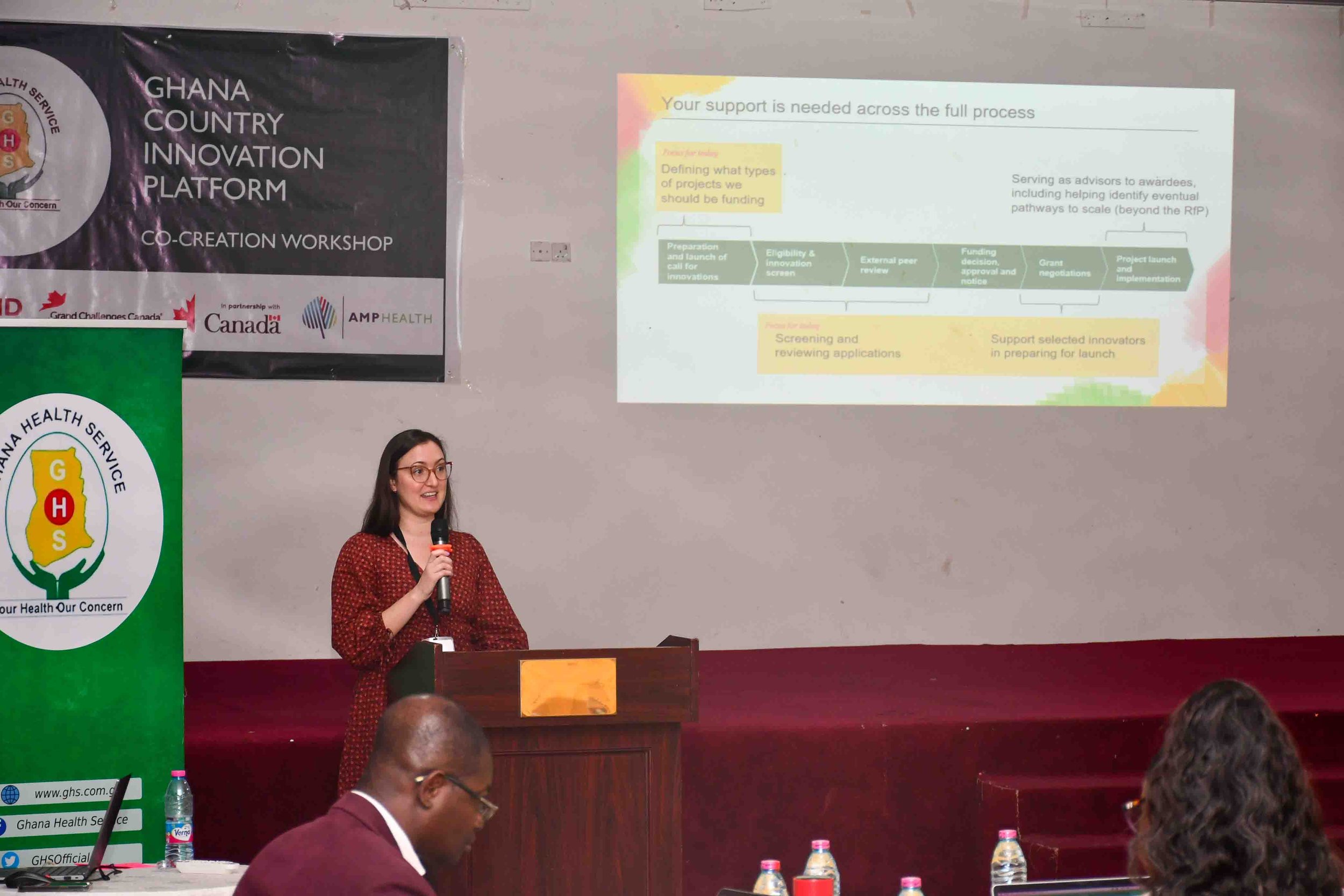
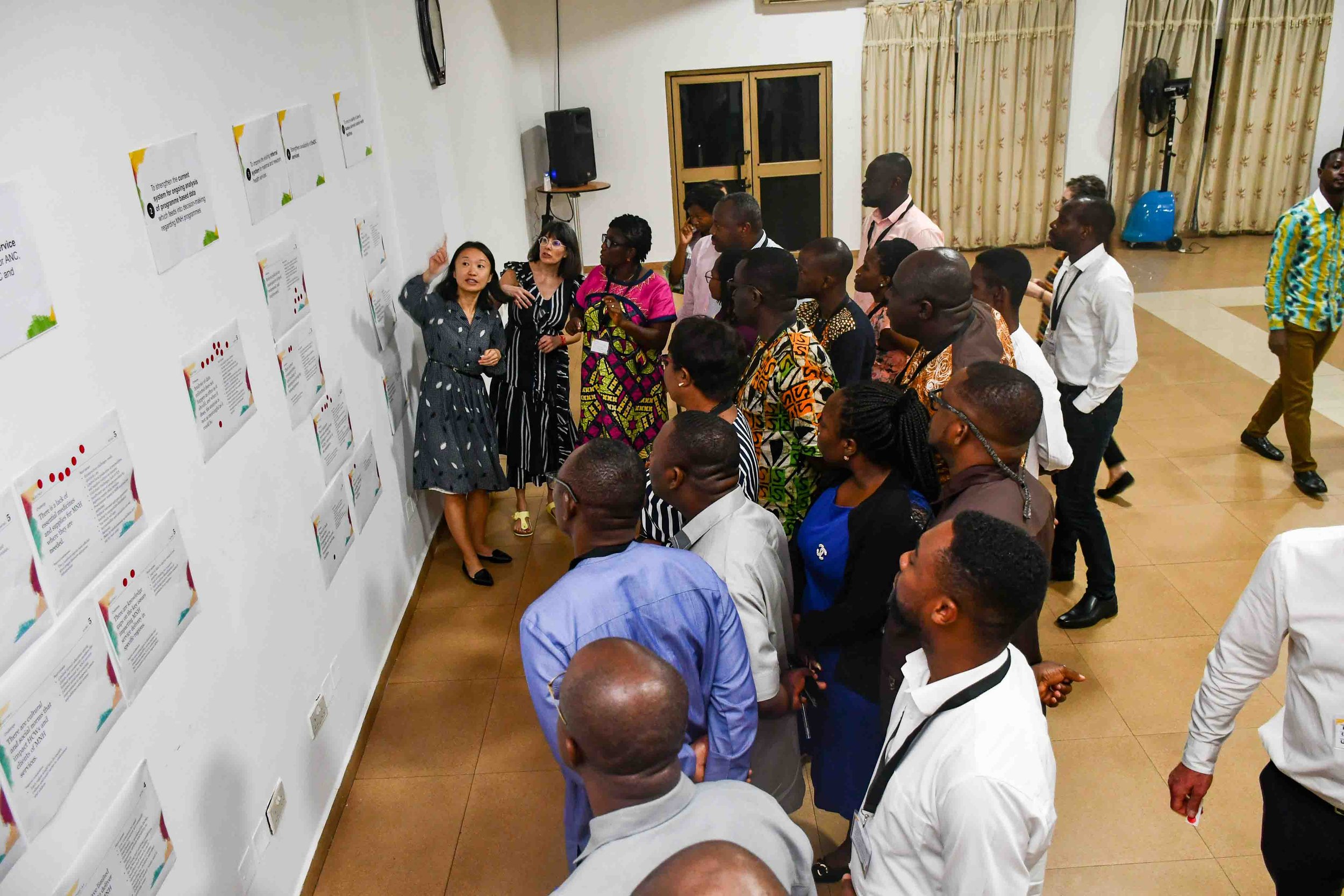
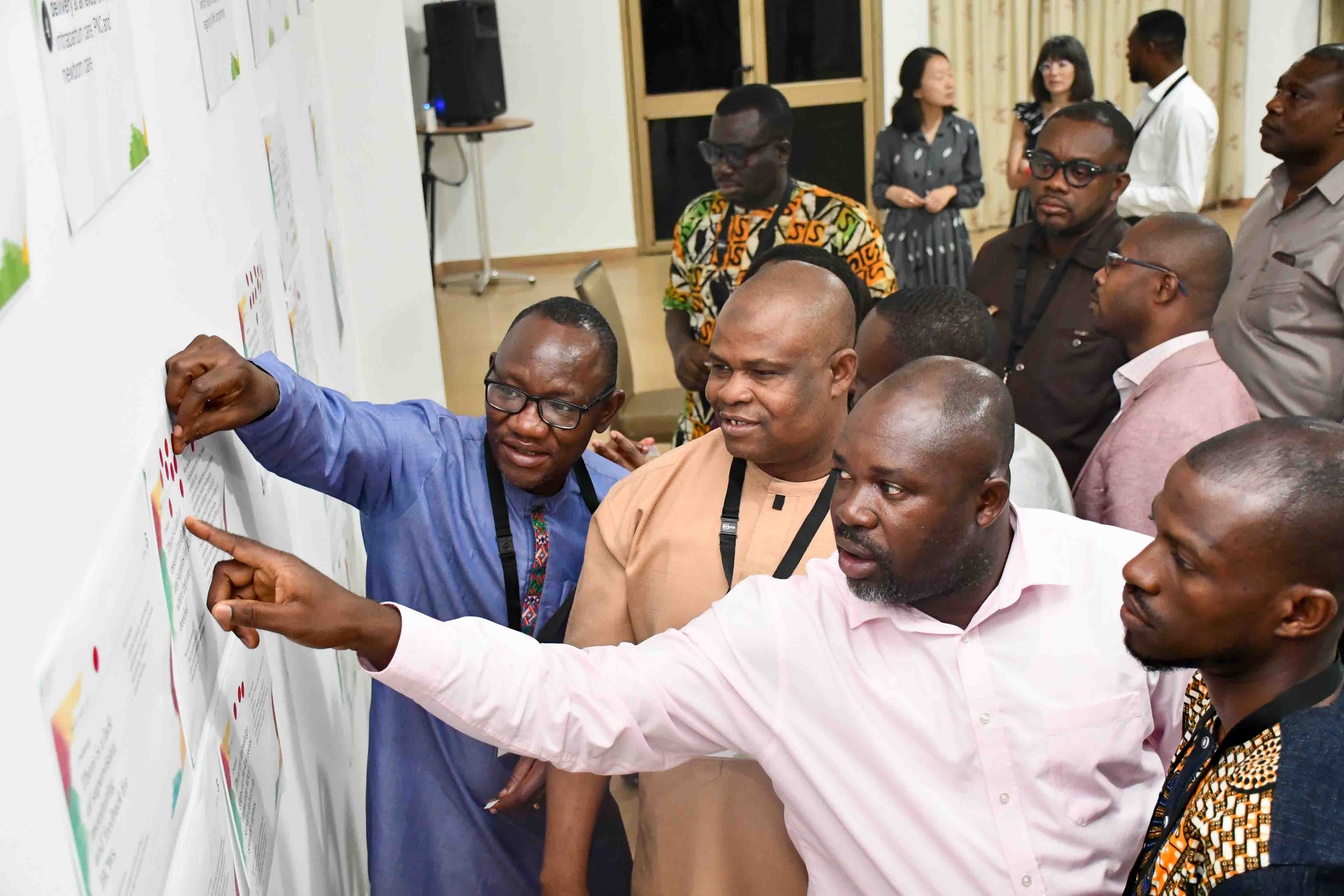
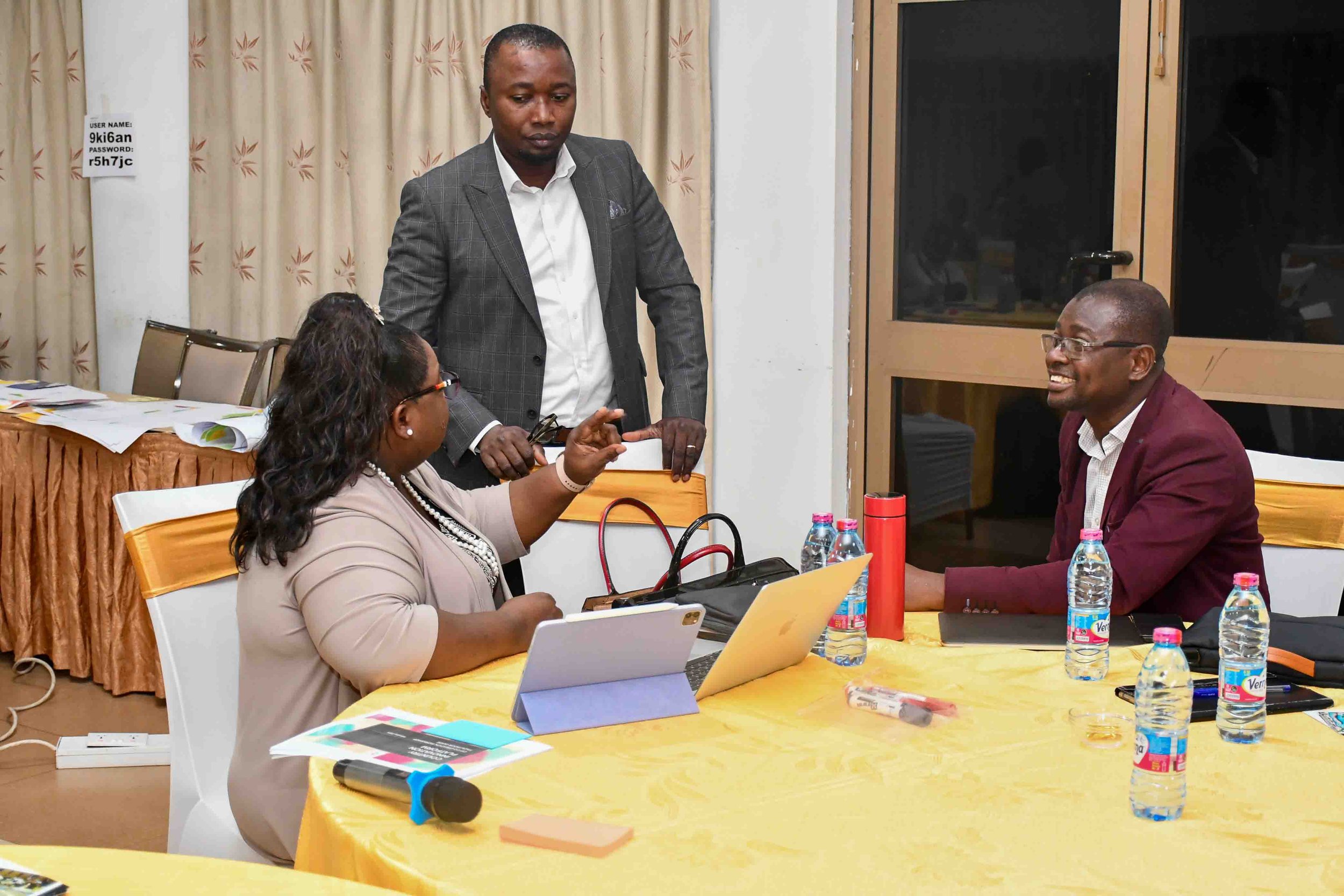
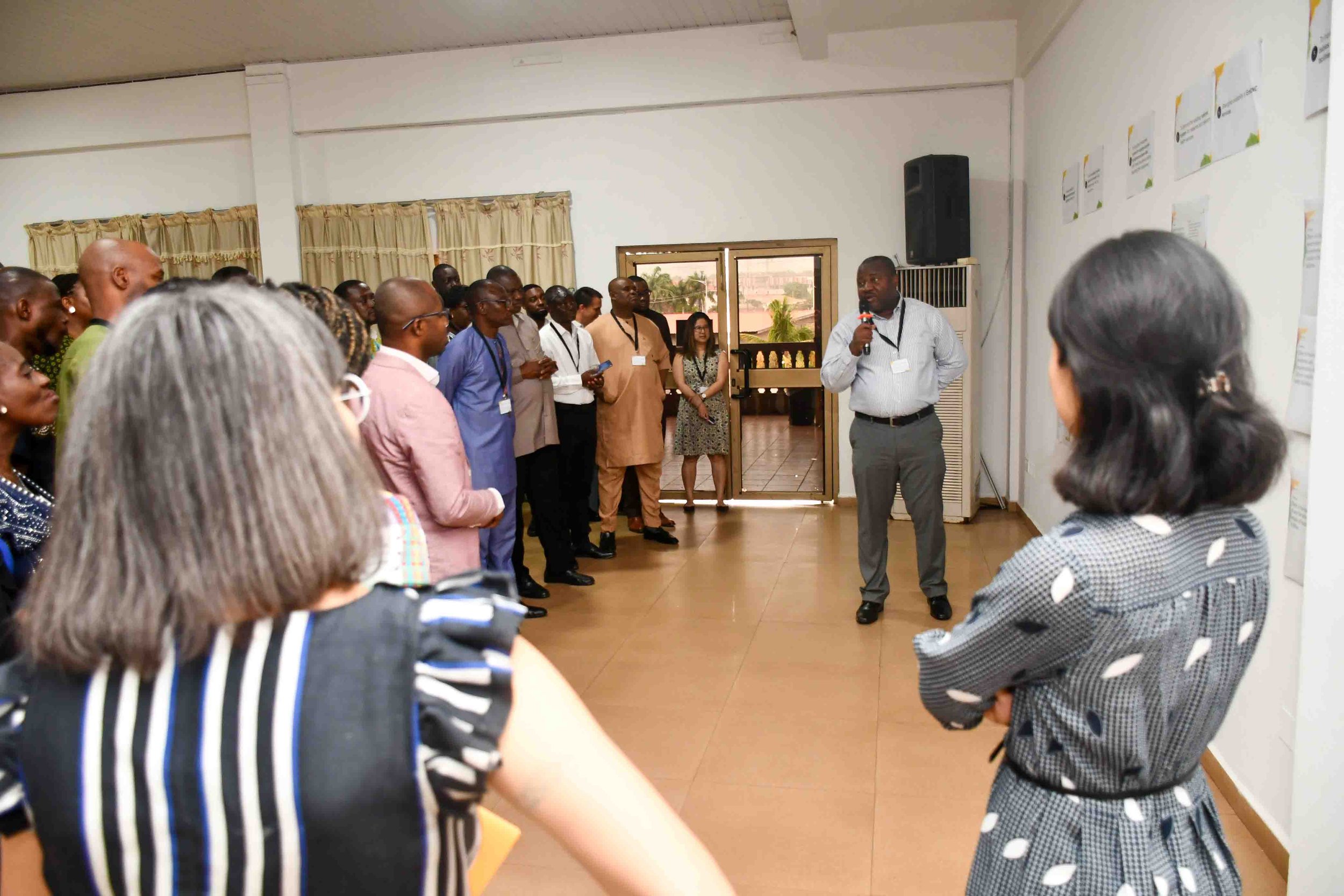
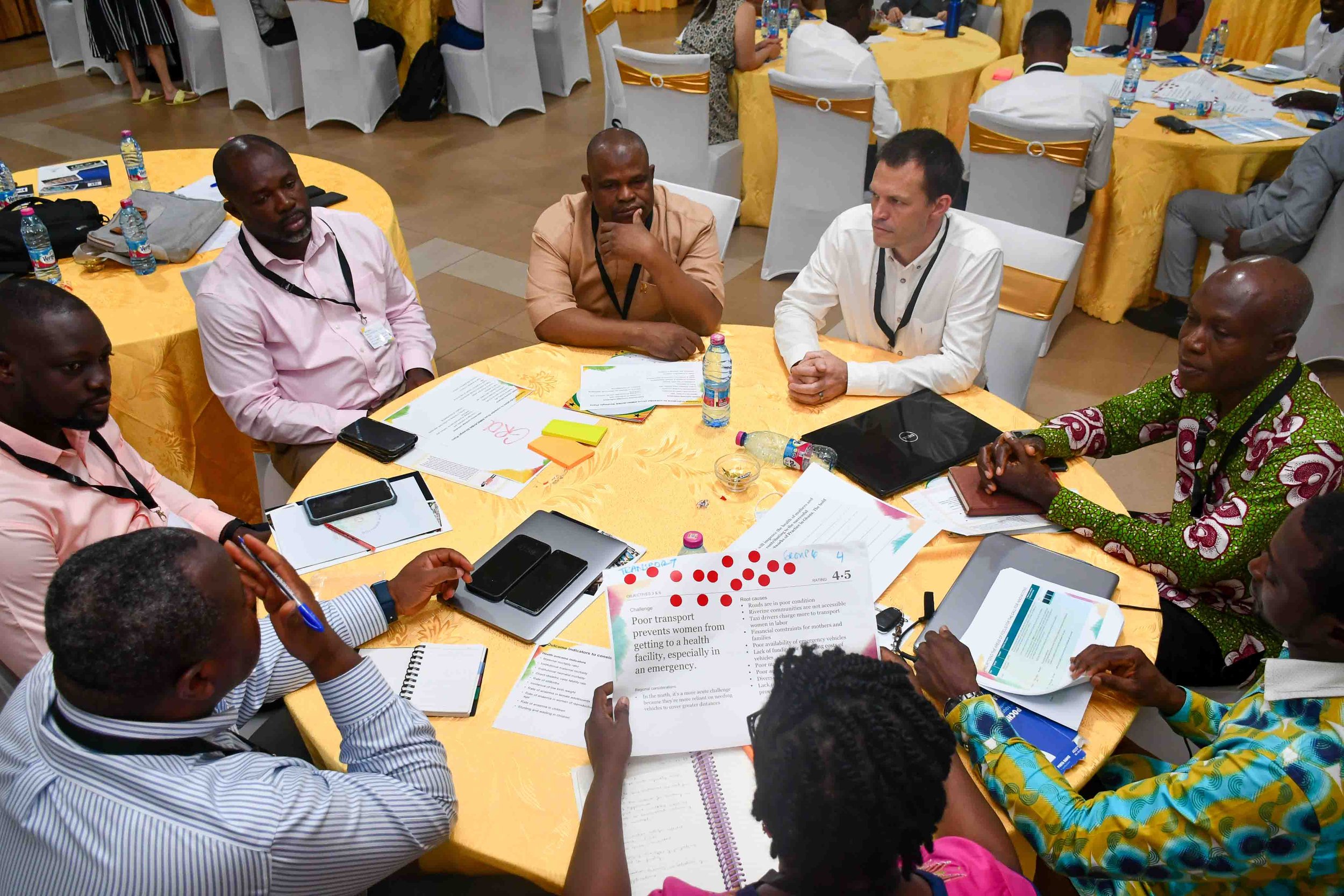
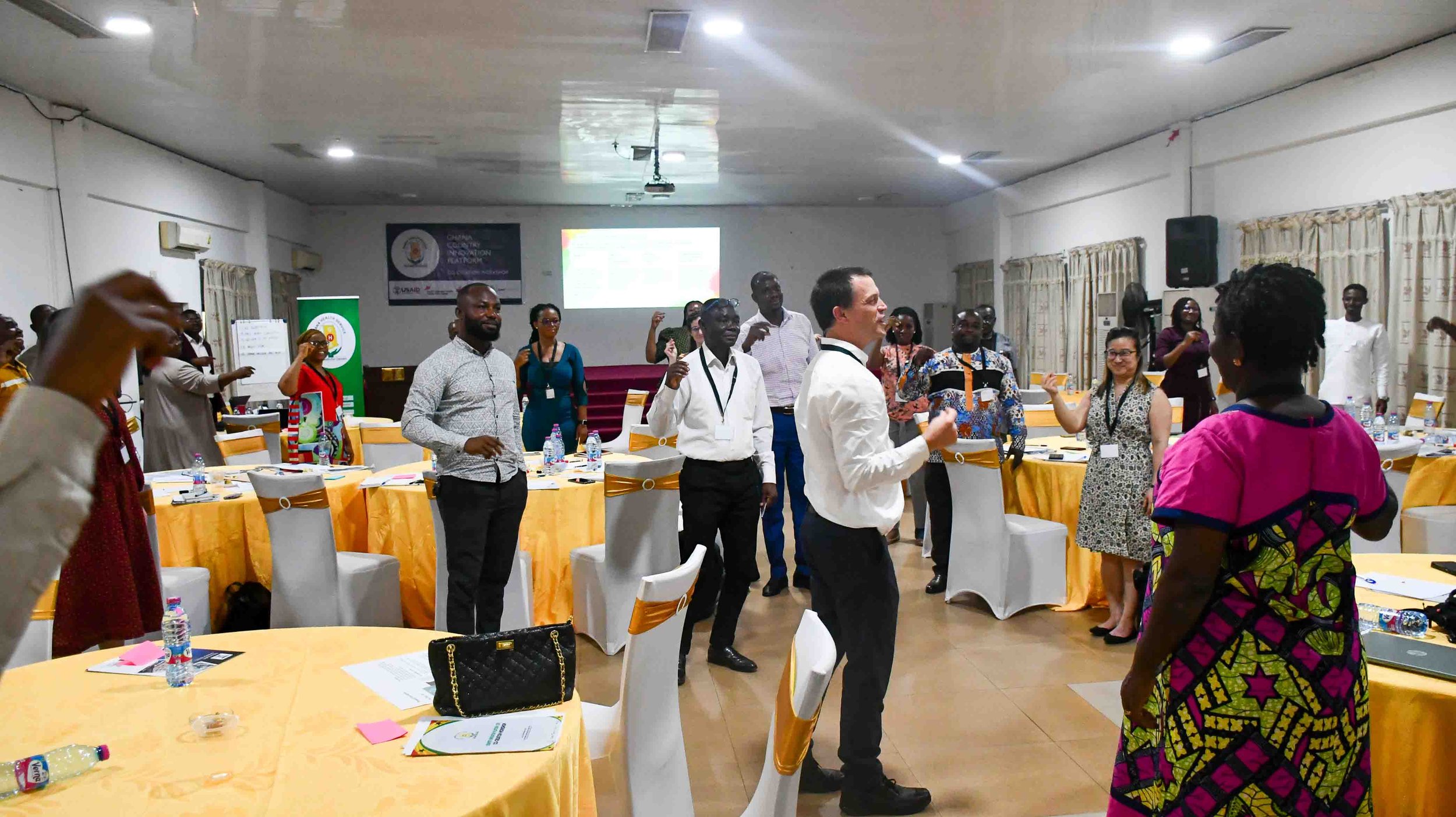
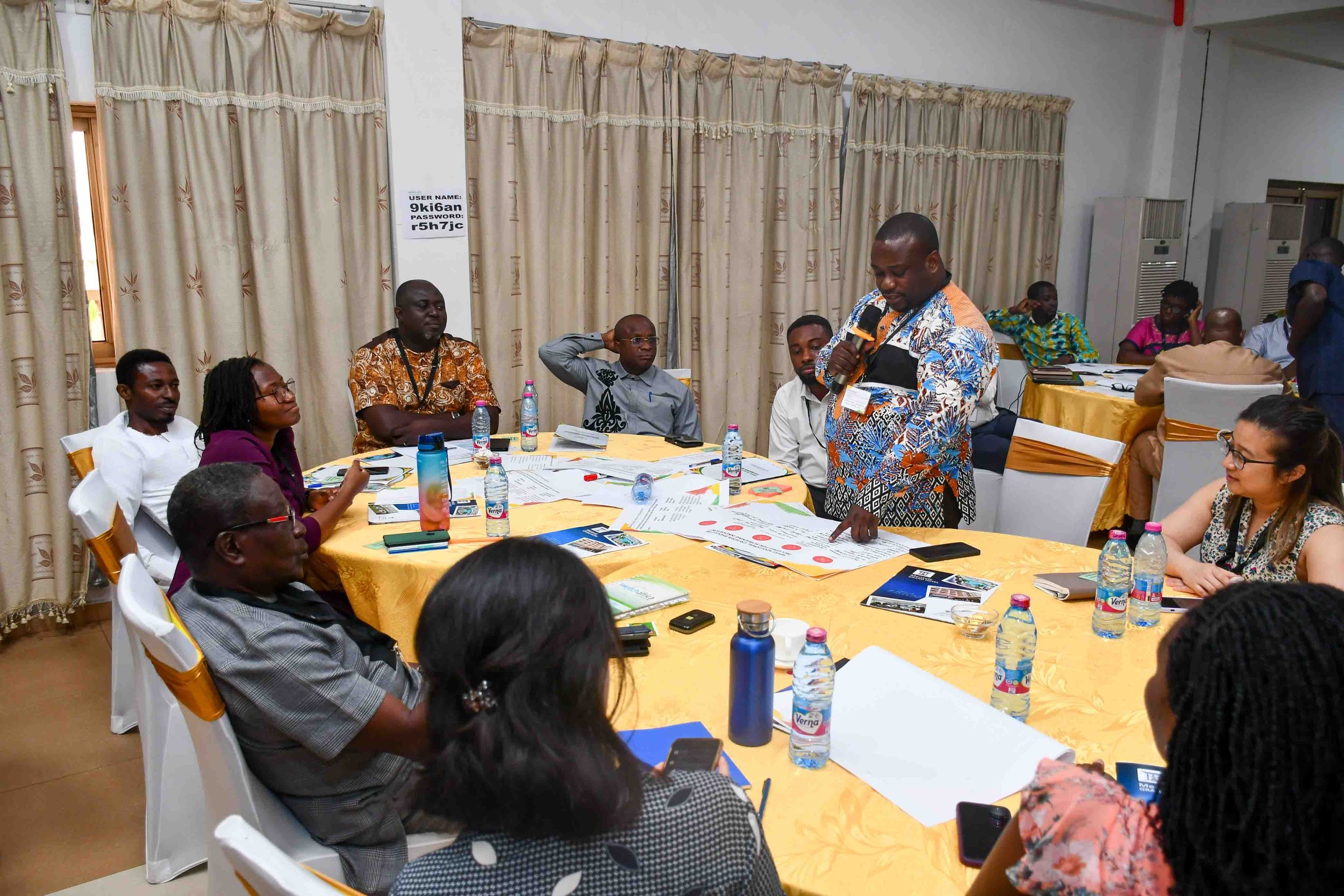
AMP Health has embedded a Management Partner, Chioma Ogbazar, within the Ghana Health Service (GHS) to support the work of the CIP. Chioma will work with both the GHS team, helping them to identify health challenges that are particularly suited to disruptive innovation, and strengthening the leadership and management capabilities that are needed to scale-up and institutionalise new innovations. She will also work with the health innovators, helping them to identify challenges that align with government priorities and have the most potential to be adopted.
While advancements in healthcare have often been associated with high-tech innovations that are developed in wealthier countries, there is a growing recognition of the importance of low-cost, scalable solutions that are developed by the communities that stand to benefit most from implementing them.
The CIP is at the forefront of this trend in Ghana, working to identify and support local innovators in developing solutions to the country’s most pressing health challenges.
Over the years, Ghana has faced several challenges such as a low investment in healthcare, reliance on imports to meet its healthcare needs, limited funding and resources, and high healthcare costs. Despite progress being made, many rural communities still lack access to modern healthcare services and are forced to travel long distances to access care. This has contributed to high maternal and child mortality rates, and other concerning health outcomes.
By investing in a local innovation ecosystem, the CIP aims to identify innovative solutions to Ghana’s current health challenges, as well as to build the enabling environment for developing the innovative solutions that will address future health challenges.
A thriving health innovation ecosystem would also contribute to important economic benefits, both through direct investment in these innovations and as a result of the long-term economic benefits of a healthier and more productive population.
AMP Health Partner Chioma Ogbazar expressed her thoughts on the potential challenges the CIP might face, saying: "The innovation community in Ghana is still growing and operates in silos. It would be great to see different innovators collaborating and resolving complex sectoral issues." Chioma believes that the ultimate goal of the CIP is to “establish an ongoing platform for defining measurable health challenges, and build an in-country system that can identify and support innovations that respond.”
The launch of the CIP is a notable move towards enhancing Ghana's healthcare sector, and promoting localised healthcare solutions for the country's citizens.
Empowering regional mentors to strengthen healthcare on a national scale in Ghana
Four years ago, Ghana moved to create six new regions, presenting a unique opportunity to improve public access to services. However, building effective health services in new regions that are still largely rural is a mammoth task. The Ghana Health Service (GHS) partnered with AMP Health to support leadership and management capability development for the newly established Regional Health Management Teams, which are responsible for health services in the six new regions.
Four years ago, Ghana moved to create six new regions, presenting a unique opportunity to improve public access to services, including healthcare, by decentralising service delivery and establishing new regional administrations.
However, building effective health services in new regions that are still largely rural is a mammoth task. It demands investment, not only in infrastructure, logistics, and systems, but also in the leadership and management skills of the people responsible for administering the health system within these areas.
Recognising these crucial building blocks, the Ghana Health Service (GHS) partnered with AMP Health to support leadership and management capability development for the newly established Regional Health Management Teams (RHMTs), which are responsible for health services in the six new regions.
Our interactions with ministries of health throughout Africa have demonstrated a significant need for investing in leadership and management at the sub-national level of health systems, even more so when teams are new, in order to succeed in expanding public access to health services.
Under this new partnership, AMP aims to support the GHS to establish an approach that has the potential to simultaneously drive health system strengthening efforts on a sub-national level, while contributing to the institutionalisation of leadership and management capacity building at a national level. The lessons from this partnership will inform the way that the GHS approaches the development of leadership and management skills, and guide the government’s approach to building teams and developing leaders throughout the health system.
Working with regional mentors
Along with the establishment of new RHMTs, the GHS has assigned a regional mentor to each of the new regions to provide capacity building support within the new RHMTs. Working with a group of local mentors - senior public health officials who have worked in various capacities of leadership in the Ghana Health Service - means that they have deep knowledge of the local context and understand what is required to effectively integrate these new regions into the national system.
“The mentors leverage their professional knowledge, experience and expertise combined with their coaching skills to empower the Regional Directors and their teams to make strategic decisions and to find solutions to the complex issues the regions encounter.”
Six months into the project, a strong foundation has already been laid, following a three-day training session to help mentors develop their mentoring and coaching skills. “Equipping the mentors with these skills and tools at the beginning of the project was crucial to its effective implementation,” says Ronke. The mentors have also completed their initial diagnostic assessment to identify the leadership and management needs within each team.
Based on the outcome of the assessment, an action plan was developed to address the gaps identified, and mentors have been providing monthly remote support and guidance to their mentees over the last few months.
Ronke is heartened by early feedback from the mentees, one of whom says, “The mentoring is going smoothly. I feel very fortunate to have a mentor who has lived the experience of the GHS leadership at all levels.”
A multilingual Leadership Lab for NCD teams from Liberia, Malawi and Mozambique
Last month, AMP Health convened our first cross-country in-person Leadership Lab since the Covid-19 pandemic. The multi-day event, held in Maputo, Mozambique, brought together NCD teams from Liberia, Malawi and Mozambique, and focused on empowering them to make a strong investment case for NCDs in their countries.
Growing rates of noncommunicable diseases (NCDs) pose a real threat to the health and lives of millions of people living in Africa.
Responsible for 37% of deaths in 2019, NCDs such as cancer, cardiovascular diseases, and diabetes are rising, in-part due to weaknesses in the implementation of critical control measures including prevention, diagnosis, and care.
NCD teams on the continent typically face a triad of challenges: the rapidly rising burden of NCDs, high expectations from political leaders, and inadequate human and financial resources. Building these teams' leadership and management capabilities can help them better prioritise the use of scarce resources, develop costed and feasible strategic plans, and communicate the importance of greater investment in combatting NCDs.
In November, AMP Health convened our first cross-country in-person Leadership Lab since the Covid-19 pandemic. The multi-day event, held in Maputo, Mozambique, brought together NCD teams from Liberia, Malawi, and Mozambique, and focused on empowering them to make a strong investment case for NCDs in their countries.
But how do you create a memorable learning experience in a room of people who don’t speak the same language?
Chief Learning Officer at AMP Health, Klara Michal, says it was important to be transparent about what the event was going to be like from day one. “Creating an environment where people don't have to worry, because you know that others will take the time to listen or translate for you, creates a space for openness and learning. We let people know that this is the price of inclusion - slowing down and practising elements of patience, and caring enough to listen and potentially do some things you're not used to.”
Many of the sessions combined presentation slides in both English and Portuguese, while having simultaneous live translation in other languages. “Facilitators were careful about getting the most important points across, and all instructions were available in both key languages. We designed activities where it would be easier to mix languages and created time for self reflection, where it didn't need to be about talking, just about experiencing something together,” says Klara.
But it was more than just translation that helped facilitate connection. Klara explains that the design of the NCD Lab allowed teams to be active creators of learning content rather than passive recipients of presentations.
“We created space for relationship building, which allowed us to cross cultural boundaries,” she explains. “So much of the learning happened during the moments in between sessions, moments standing around the coffee. A lot of knowledge sharing is based on relationships, which takes time”.
This model of experiential learning allowed the programme teams to build relationships with one another that will continue into the future. “When you add different modes of learning as well as colour and fun to it, you really can access peoples’ state of learning. The time spent on relationships and experiential moments were the most memorable,” Klara added.
“Every time I interact with AMP I’m impressed, and I think, wow this is amazing what they’ve done and then they take it to the next level.”
Our learning model at AMP Health is rooted in human-centred design. According to Klara, the Leadership Lab further demonstrated the value of this approach when she observed participants enjoying moments of applying techniques that they had just learned, playing around, and trying new things. Although the Lab took place only a few weeks ago, positive feedback has already been shared by participants.
Following the Leadership Lab, a number of team members also shared that they immediately began working on investment cases for their own countries, and were excited to put their learnings around data usage, stakeholder engagement and effective communication into practice.
How data collection in community health is paving the way for real change in Togo
There are over 8 million people living in Togo, West Africa, and yet if you asked, no one could have told you how many community health workers there were in the country. An innovative community health worker mapping initiative aims to address this. The project was recently carried out by the Division of Community Health and the Elderly (or DSCPA, to give it its French acronym) with the support of AMP Health.
There are over 8 million people living in Togo, West Africa, and yet if you asked, no one could tell you how many community health workers there are in the country.
We do not know where they live, what training they have received, or how much they are being paid. We do not know how old they are or how many people live in their households. We do not know how many patients they see or what conditions they are treating.
So how can governments, policymakers and supporting organisations make informed decisions that can influence real change within the healthcare system of the country?
Accurate data rooted in demographics, socioeconomics, and cultural traditions is more important than ever for planning how to allocate scarce resources, for identifying the health needs of a population, and for detecting early warning signs of emerging health emergencies that will improve health at a grassroots level.
An innovative community health worker mapping initiative aims to address this in Togo. The project was recently carried out by the Division of Community Health and the Elderly (or DSCPA, to give it its French acronym) with the support of AMP Health.
The project aims to describe the current landscape of community health workers, identify learning opportunities and make data available to anyone in the world developing solutions to health challenges in Togo.
Having partnered with the DSCPA since 2020, supporting the team in developing a range of technical, managerial and leadership skills, we understood the capacity building needs for the team to effectively roll out this complex project.
“The mapping project presented us with many opportunities to build the team’s skills because there were so many moving parts,” says AMP Health Management Partner Ramadane Hagne. “We had to do the initial research, design data collection tools, set up an electronic data collection platform, train data collectors, carry out the data collection, verify the data, and manage a team of interviewers.”
To date, the entire project has been carried out by the DSCPA team and the AMP Management Partner, without the need for any external consultants or service providers. This kept the project costs at a fraction of comparable mapping exercises, and the Ministry was able to cover 70% of the project costs themselves, with the remainder funded by AMP and Integrate Health (an NGO that works to expand access to healthcare in Togo).
This is rare, as Africa’s dependency on foreign funding for public health interventions often means that on-the-ground solutions and interventions are driven by people with limited knowledge of the lived experiences of the communities they are meant to serve. For this project, we equipped the DSCPA team with the skills carry out this mapping exercise in close partnership with community members, ensuring that the approach was culturally sensitive and relevant.
“AMP Health doesn’t have an agenda, so they gave the Management Partners the confidence to try new things with the team. It wasn’t easy, we tried and failed, but putting the Management Partner in the environment helped them learn,” says Ramadane.
The DSCPA managed a team of 85 data collectors who administered an 88-question survey to more than 11 400 community health workers. The result thus far form one of the richest datasets ever collected on such a large group of community health workers, and will provide invaluable insights that will help guide the future of the DSCPA programme and healthcare in the country more broadly.
“This project has shown us that knowledge is power,” says Moussa Caramlaye Bouraima, a DSCPA team member. “We know so much more than we did before. Now we can show partners where the issues are that need to be addressed.”
The data set has since been made available to health sector decision-makers, ministers and the government in Togo, and is already being used to inform planning and initiatives around the training of community healthcare workers across the country.
The project has also provided extremely valuable insights that have helped the Ministry of Health identify key areas for improvement. “We discovered that women only represent 20% of community health workers in Togo,” says Ramadane. “This was surprising, particularly considering child and maternal health needs. We are now aiming to have 50% of women and 50% of men.”
“We are also prioritising training in the four main diseases - malaria, diarrhoea, pneumonia, and malnutrition - that have caused the most deaths in children. We had assumed that most community health workers had training in all four, but we discovered that this is not the case, so we are pushing for much more training in those areas,” Ramadane adds.
Already proving to be an invaluable resource for the healthcare sector in Togo, we look forward to seeing this data being used to inform decisions that will lead to improved health outcomes across the country in the next few years.
Welcoming six new AMP Health Partnership Board members
We are truly delighted to have welcomed six new members to the AMP Health Partnership Board this year. They are outstanding individuals who reflect the communities we serve and are equally passionate about our ethos as an Africa-based initiative.
We welcomed six new partnership board members in 2022. They bring with them a diverse set of skills, experiences and networks that will help guide and support the AMP Health team as we continue to increase the number of our partnerships throughout Africa to meet rapidly rising demand.
As an organisation that partners with public sector teams across Africa, we are proud that five of our new board members are from Africa. This positions us strategically to tackle the continent's unique development, leadership and management opportunities and challenges in the health sector and beyond, with experts who have lived and led on the continent we serve.
In addition, half of our new board members are women. While women make up 70% of the health workforce, they remain the minority in global health leadership. Greater diversity in health leadership, particularly greater representation of women, is essential to ensure that development approaches on the continent are shaped by diverse perspectives.
“We are truly delighted to have welcomed six new members to the AMP Health Partnership Board this year. They are outstanding individuals who reflect the communities we serve and are equally passionate about our ethos as an Africa-based initiative. As we look toward the next year, we are excited about the opportunity to meet rising demand across Africa for partnership with AMP to unlock the full potential of public sector teams through the development of leadership and management excellence.”
Dr Dzingai Mutumbuka is a former Minister of Education for Zimbabwe, and the former Chair of the Association for the Development of Education in Africa (ADEA). From 1990 to 2007, he held various senior management positions at the World Bank in the education sector, and currently serves on the boards of UNESCO’s International Institute for Educational Planning, Harvard Ministerial Leadership Program, Big Win Philanthropy, Vitol Foundation, Teach for All, Educate!, and Results for Development. He is also a member of the Luminos Fund’s Advisory Board.
Dr Fatoumata Nafo is a public health official and doctor who previously served as Mali’s Minister of Health and Minister of Social Affairs, Solidarity, and Elderly. Having started her career at a community level, she worked in the public health sector for more than 25 years. Her most recent position was Regional Director of Africa at the International Federation of Red Cross and Red Crescent Societies, with previous roles including Executive Director of the RBM Partnership to End Malaria, WHO Representative to Ethiopia, and WHO Representative to Congo.
Mosun Layode currently serves as the Executive Director of the African Philanthropy Forum (APF), where she works across Africa with established and emerging philanthropists who are committed to the sustainable and inclusive development of Africa. Holding two decades of experience in international development and nonprofit leadership, Mosun was instrumental in the establishment of APF as an independent entity, increasing its reach and impact in the philanthropic community, as well as growing its brand and membership base. Prior to this, she served as the Executive Director of WIMBIZ and LEAP Africa, leading nonprofits in Nigeria.
Nneka Eze is a General Partner and Managing Director at VestedWorld, a venture capital firm focused on emerging markets. As a former Partner at Dalberg, she served as Nigeria Director and co-led Dalberg’s Global Agriculture and Food Security Practice. Nneka also serves on the board of the Impact Investors Foundation of Nigeria and The Resolution Project, and previously served on the West Africa Steering Committee as a member of the Aspen Network of Development Entrepreneurs for six years.
Sherwin Charles is the co-founder and CEO of Goodbye Malaria. A chartered accountant with extensive private sector experience, he worked in banking and financial services for 13 years before joining Nando’s in 2006, where he set up the company’s treasury function. Together with Nando’s co-founder and other partners, he founded Goodbye Malaria in 2012, and left Nando’s in 2015 to take on the role of CEO at Goodbye Malaria. Sherwin currently serves as a board member for the Global Fund, and the Innovative Vector Control Consortium.
Tom Kagerer is a partner at LGT Venture Philanthropy (VP). Tom has held various roles at LGT VP over the past 12 years and has supported the growth of 70 organizations. Tom also serves on the LGT VP Investment Committee and oversees the foundation’s global health strategy. Before joining the philanthropic sector, Tom spent nine years with BMW in Germany and the UK..
For more information on our new board members and the broader AMP Health team, click the button below:
AMP Health wins Future United Collaborator Award
At AMP, we believe in the power of partnerships and collaboration to achieve ambitious health goals. By working with government partners, NGOs, the private sector and philanthropists, we aim to collaborate to support countries to strengthen institutions and improve health goals.
On Thursday 22nd September in New York, GBCHealth - a 20+ year old NGO with a strong history in bringing businesses, investors, governments & NGOs together to fight malaria, TB & HIV/AIDS - announced the winners of its inaugural Future United Awards.
AMP Health won the Collaborator Award in recognition of our work partnering with government teams to strengthen leadership, management, and governance skills in support of achieving public health goals.
Watch our Executive Director, Robert Newman, accept the award on behalf of the AMP team below, and read more about Future United and the other awardees here.
Welcoming the Liberia NCD team
“I’m an introvert, surrounded by extroverts,” chuckles Dr Anthony Tucker, Director of the Non-Communicable Diseases (NCD) division in the Liberia Ministry of Health. It is a light-hearted moment during the exercise on team member strengths and differences on Day 2 of the team’s onboarding workshop with AMP Health in Monrovia in January 2022 – work supported by a grant from the Helmsley Charitable Trust. But the moment also conveys an important message about preferred working styles, which is not lost on the astute medical doctor-turned administrator tasked with marshalling the country’s response to NCDs such as Type 1 and Type 2 diabetes, cardiovascular diseases, and cancers.
“I’m an introvert, surrounded by extroverts,” chuckles Dr Anthony Tucker, Director of the Non-Communicable Diseases (NCD) division in the Liberia Ministry of Health. It is a light-hearted moment during the exercise on team member strengths and differences on Day 2 of the team’s onboarding workshop with AMP Health in Monrovia in January 2022 – work supported by a grant from the Helmsley Charitable Trust. But the moment also conveys an important message about preferred working styles, which is not lost on the astute medical doctor-turned administrator tasked with marshalling the country’s response to NCDs such as Type 1 and Type 2 diabetes, cardiovascular diseases, and cancers.
After the exercise Dr Tucker shares with his team that, as an introvert who likes to make decisions only when he has all the facts, he now understands why he sometimes gets frustrated with his team, many of whom are extroverts with a more exploratory problem-solving style. Dr Tucker offers to be more patient, but in return he asks the team to do more research and planning before bringing a project or decision to him for his input. It is a key moment.
Luckily for Dr Tucker, he is not the only methodical planner in the room. His team’s new AMP Health Management Partner, Ande Hyeroba, also prefers a more considered decision-making style. Hyeroba will be embedded with the team for the next two years as a thinking partner, coach, and facilitator, to build team and personal effectiveness. The AMP model and Hyeroba are new to Dr Tucker and his team, so much of the focus of the three-day workshop is on introducing the AMP management partner model.
AMP are displaying their commitment to in-country support with a five-person delegation. Tendo Kiribakka, AMP’s Deputy Director for Country Support, and Country Support Manager Rihlat Said Mohamed explain to Dr Tucker’s team how AMP partners with government health teams to help them achieve their goals. Chief Learning Officer Klara Michal and Senior Learning Expert Rhys Johnstone are there to model AMP’s experiential learning style and facilitate sessions with the team on personal awareness, team effectiveness, planning, and prioritisation.
The workshop is also an opportunity for the Management Partner and the rest of the AMP team to understand the Liberia NCD team. Dr Tucker articulates the team’s mission and explains the context in which they work, the challenges that they face and their aspirations for the future. Now it is the turn of the AMP team to nod heads as they appreciate the importance of NCD team and the resource challenges they face. The workshop gets a boost when Deputy Minister of Health and Chief Medical Officer, Dr Francis Kateh, addresses the session. Dr Kateh underlines the importance of capacity building in the health department and the importance of tackling diseases such as diabetes in Liberia – and endorses the AMP model of a capacity building partnership.
The payoff of the workshop is felt immediately: the week after the session Dr Tucker decides to make some changes to how the team work together. In return for the team gathering more information before approaching him, he will allow room for spontaneous feedback in meetings and brief cross-office chats with colleagues will be encouraged, to cater for the extroverts on the team.
Another almost instant impact of the onboarding workshop is that the team is using the prioritisation technique modelled in the workshop to conduct their annual planning meeting, in which each co-ordinator presents what they consider the most critical activities for 2022.
The investment in establishing ways of working together has also paid off: Hyeroba reports that in the weeks following the onboarding workshop, team members have approached him for coaching on report writing, goal setting, and planning, rather than asking him to do this work himself – providing him with an opportunity to support the team in building skills that they can immediately put into practice.
LGT Venture Philanthropy announces three-year follow-on investment in AMP Health to strengthen primary healthcare in sub-Saharan Africa
With its three-year follow-on investment, LGT VP seeks to help AMP Health grow from working in seven countries and 10 Ministry of Health (MOH) teams to 19 countries and 23 MOH teams by 2024.
Washington, DC, USA, 26 October 2021 – LGT Venture Philanthropy Foundation (LGT VP) announces its continued engagement with AMP Health, a public-private partnership based in South Africa. With its three-year follow-on investment, LGT VP seeks to help AMP Health grow from working in seven countries and 10 Ministry of Health (MOH) teams to 19 countries and 23 MOH teams by 2024.
A leading partner in Africa, working with multiple countries to build innovative and effective public health teams
Founded in 2015, AMP Health works to improve health systems and outcomes by collaborating with governments to strengthen the leadership and management capacity within MOH teams. Led by Dr. Robert Newman, AMP Health’s approach combines embedded mentoring and capability development; experiential learning through interactive in-person and online training; executive coaching; curated self-directed learning; and peer exchange across countries to build highly effective public sector teams and accelerate the adoption of new technologies and facilitate the sharing of best practices.
A cost-effective model, to equip government teams to scale national community health systems
After one year into the partnership, LGT VP has come to know AMP Health as an effective organization that empowers government teams to better define, plan and execute national health strategies. AMP Health’s solutions and a lean team have rendered the organization’s work attractive to national governments and strengthened AMP Health’s reputation across Africa. The embedded nature of AMP Health’s model as well as a successful pivot to online learning sessions allowed MOH teams not only to respond to the pandemic swiftly, but also to ensure that essential healthcare services continued.
A driving force, expanding LGT VP’s network to health thought leaders across the continent
One of LGT VP's health strategy goals is to support national community healthcare solutions in five African countries by 2023. The foundation has developed a complementary healthcare strategy, which supports intermediaries that build finance and management capacity within MOH teams on the one hand, and improves on-the-ground health providers’ operational capacity on the other. AMP Health’s work is complementary to that of other innovative organizations in the LGT VP portfolio, including the Financing Alliance for Health, mothers2mothers and Last Mile Health.
“The COVID-19 pandemic has laid bare the complexities that public health teams face. Effective responses to the pandemic require teams that have the leadership skills to mobilize people across sectors and the management skills to effectively carry out complex operations,” says Dr Newman. “LGT VP’s system-wide approach is an excellent example of the type of commitment required to strengthen health systems at scale.”
“At LGT VP, we firmly believe in the importance of strong teams with robust finance and management capabilities. AMP Health demonstrated its ability to strengthen L&M skills of MOH teams in many African countries. 95% of MOH team members report that L&M has increased their ability to make significant contributions to public health in their country. Through our multi-year commitment to support AMP Health to further expand their work, LGT VP supports countries across the African continent to build stronger health systems that are high in quality and accessible to everyone,” states Tom Kagerer, Partner at LGT Venture Philanthropy.
AMP Health is a non-profit initiative supporting governments to build visionary and effective public sector teams. It has its main operational hub in Johannesburg, South Africa, and is supported by a team at the Aspen Institute, a nonpartisan 501(c)(3) organization based in Washington, DC. For more information, please visit www.amphealth.org.
LGT Venture Philanthropy is an independent charitable foundation established in 2007 with teams in Switzerland, Sub-Saharan Africa and India. The foundation strives to improve the quality of life of disadvantaged people, contribute to healthy ecosystems and build resilient, inclusive and prosperous communities. LGT VP deploys philanthropic capital to organizations with effective, innovative and scalable solutions to social and environmental challenges, thus directly contributing to the Sustainable Development Goals. For more information, please visit www.lgtvp.com.
The Helmsley Charitable Trust Partners with AMP Health to Accelerate Progress against Non-Communicable Diseases in Africa
The Leona M. and Harry B. Helmsley Charitable Trust today announced a new $3 million, three-year grant to AMP Health to strengthen leadership and management skills in teams that are responsible for managing Type 1 diabetes (T1D) and other non-communicable diseases (NCDs) in the Ministries of Health of Liberia, Malawi and Mozambique.
[Johannesburg, South Africa, and New York, United States of America, 23rd September 2021]: The Leona M. and Harry B. Helmsley Charitable Trust today announced a new $3 million, three-year grant to AMP Health to strengthen leadership and management skills in teams that are responsible for managing Type 1 diabetes (T1D) and other non-communicable diseases (NCDs) in the Ministries of Health of Liberia, Malawi and Mozambique. The grant will enable AMP Health to partner with public sector teams to build critical leadership and management skills necessary to achieve their goals.
“We are committed to supporting people with Type 1 diabetes so that they have what they need to thrive, wherever they live, and that includes access to high-quality medical care – which requires strong health systems and proactive, adaptable leaders,” said Estefania Palomino, a Program Officer for the Helmsley Charitable Trust’s T1D Program. “The COVID-19 pandemic has further emphasized the need for resilient health systems and leaders who can pivot. Too often, the need for strong management is overlooked. AMP Health’s approach of providing dedicated, embedded support combined with tailored on-the-job training will develop leaders who can both address immediate needs while tackling longer-term challenges that will enable better care and, ultimately, healthier people.”
T1D is one of many chronic conditions and non-communicable diseases endured by countless individuals across low-and middle-income countries, where health systems are often not yet equipped to provide the necessary care for people to thrive. In addition, COVID-19 has further weakened already fragile health systems and disrupted essential health services, including treatments for diabetes and diabetes-related complications.
“The burden of non-communicable diseases is growing rapidly across Africa. Adapting existing health systems to serve large numbers of people with chronic – and often life-long – conditions is vitally important and requires visionary leadership and meticulous management,” said Dr. Robert Newman, Director AMP Health. “The Helmsley Charitable Trust shares our understanding of the importance of investing in these skills to ensure that tomorrow’s health systems are responsive, resilient and provide quality services for both acute and chronic diseases.”
Helmsley’s partnership will see AMP Health expanding its partnerships to Liberia and Mozambique and deepening its engagement with the Malawi Ministry of Health. AMP Health currently also supports teams in Ghana, Sierra Leone, Togo and Zambia.
AMP Health is a non-profit initiative supporting governments to build visionary and effective public sector teams. It has its main operational hub in Johannesburg, South Africa, and is supported by a team at the Aspen Institute, a nonpartisan 501(c)(3) organization based in Washington, DC. For more information, please visit www.amphealth.org.
The Leona M. and Harry B. Helmsley Charitable Trust aspires to improve lives by supporting exceptional efforts in the U.S. and around the world in health and select place-based initiatives. Since beginning active grantmaking in 2008, Helmsley has committed more than $3 billion for a wide range of charitable purposes. The Helmsley Type 1 Diabetes Program is one of the largest private foundation funders of T1D in the nation focused on understanding the disease, developing better treatments, and improving care and access in the U.S and Low- and Middle- Income Countries. For more information on Helmsley and its programs, visit www.helmsleytrust.org.
ENQUIRIES:
Dylan Edwards
Deputy Director – Communications, AMP Health
Regina Palatini
Communications Associate – The Leona M. and Harry B. Helmsley Charitable Trust
